15 April 2025
By Maynard Paton
H1 2024 results summary for M Winkworth (WINK):
- Greater “sales agreed” activity alongside a one-off £350k fee supported an improved H1, with franchise-network income up 6%, revenue up 20%, profit up 24% and the dividend up 3%.
- The targeting of “good profitability” at all four company-owned offices for FY 2025 is very encouraging, especially as three of the offices reported losses during FY 2023 and the returns from the fourth have been superb once a profit was achieved.
- Although four branches were re-franchised to new agents and a further seven look set to follow, WINK’s franchise network continues to lose ground to rival Foxtons as progress seemingly becomes more dependent on higher sales values and rising property rents.
- Dividend cover around 1.1x and net cash equivalent to a sizeable 41% of trailing twelve-month revenue continue to emphasise the board’s preference for income and the cautious approach to franchise-network expansion.
- Post-H1 statements indicating a promising H2 2024 and a possible bumper Q1 2025 support a 6%-plus dividend yield, accompanied perhaps by vague bid potential following last year’s appointments of two M&A non-execs. I continue to hold.
Contents
- News links, share data and disclosure
- Why I own WINK
- Results summary
- Revenue, profit and dividend
- Franchisees: network and competitive advantage
- Franchisees: branch openings and closures
- Franchisees: sales and lettings income
- Winkworth versus Foxtons
- Company-owned offices
- Boardroom
- Financials
- Valuation
News links, share data and disclosure
- Interim results, presentation and webinar for the six months to 30 June 2024 published/hosted 11 September 2024;
- Q3 2024 dividend declaration published 09 October 2024;
- Q4 2024 trading update and dividend announcement published 15 January 2025;
- Lawrence Alkin — Official Tribute published 07 February 2025, and;
- Q1 2025 dividend declaration published 09 April 2025.
- Share price: 200p
- Share count: 12,908,792
- Market capitalisation: £25.8m
- Disclosure: Maynard owns shares in M Winkworth. This blog post contains ShareScope affiliate links.
Why I own WINK
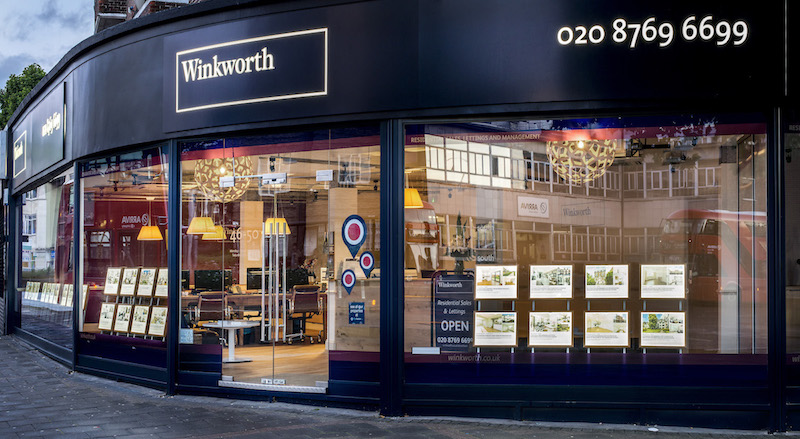
- Supports a London estate-agency franchising network, with progress buoyed by motivated franchisees winning business through tip-top service to underpin a highly reputable brand.
- Franchisor set-up leads to high margins, low capital requirements and a cash-rich balance sheet able to fund attractive franchisee investments and company-owned offices.
- Conservative family management boasts a £12m/47% shareholding, rewards investors through durable quarterly dividends and seems likely one day to consider an M&A exit.
Further reading: My WINK Buy report | All my WINK posts | WINK website
Results summary
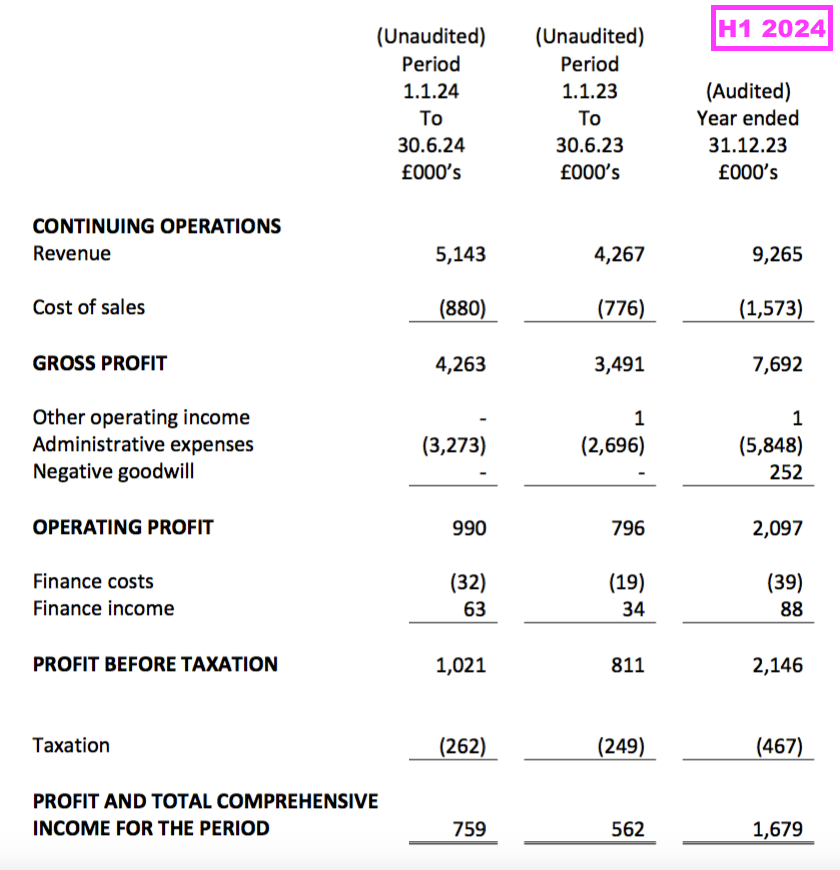
Revenue, profit and dividend
[FY 2023] “2024 has started more briskly than expected, with our sales agreed to the end of March 23% ahead of 2023, bolstered by mortgage providers reducing rates in anticipation of a rate cutting programme by the Bank of England.
We have witnessed some price weakening in the rental market with supply increasing (23% ahead of 2023 to end of March 2024) and demand declining (5% behind 2023 to end of March 2024).”
- ...followed by July’s Q2 2024 update...
[Q2 2024] ”Following expectations that interest rates had hit their peak in January, the sales market picked up significantly in Q1 2024 and, despite rates remaining unchanged, improved sentiment on the UK economy maintained this momentum. Winkworth’s sales agreed in H1 2024 were 19% higher than the comparable period in 2023. With transaction times still extended, however, we would expect many of the sales agreed in H1 2024 to complete in H2 2024.
…
Lettings activity remained positive in H1 2024, albeit increased sales activity and affordability ceilings having been reached led to a greater supply of rental properties and a fall in applicants.
…
Preliminary results show H1 2024 network sales up by approximately 8% on H1 2023 and H1 2024 network lettings by approximately 4% compared with the prior year.“
- …had already suggested this H1 would show an improvement on the comparable H1.
- The stronger performance from property sales versus property lettings that was referred to by both earlier statements was confirmed by this H1.
- H1 franchise-network sales income at £13.4m in fact gained 9% versus the 8% predicted during July, while H1 franchise-network lettings income at £14.5m did indeed climb 4%:
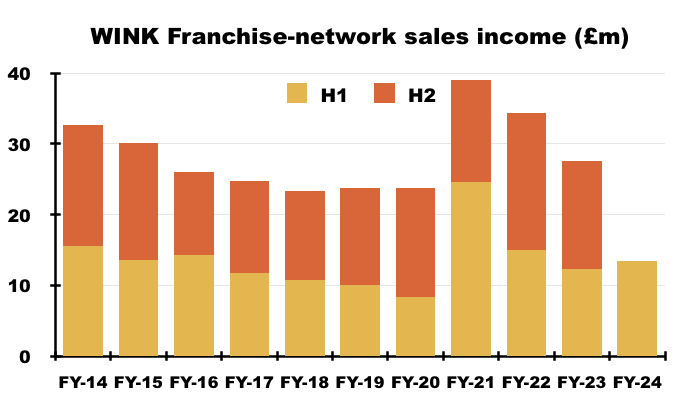
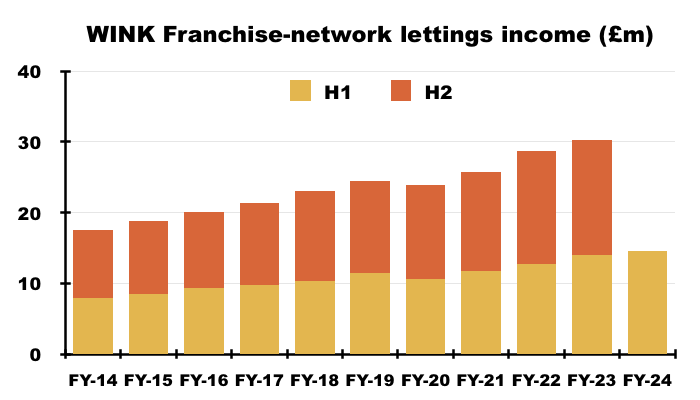
- Total H1 franchise-network income therefore advanced 6% to £27.9m:
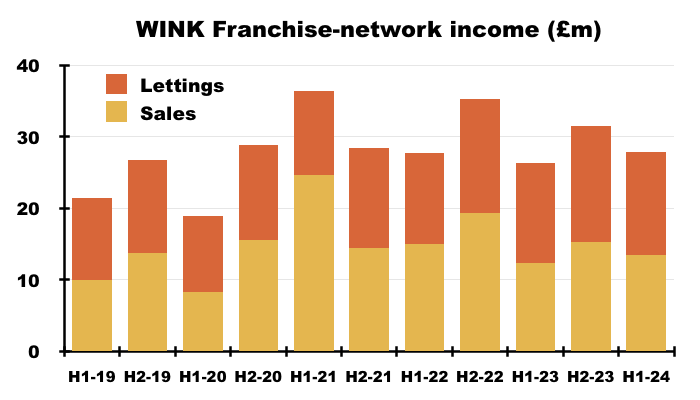
- Note that the “sales agreed” figures mentioned within both earlier statements are only guides to sales activity within WINK’s franchise network. Only when a sale completes does the group recognise its 8% share of the transaction’s commission (see Franchisees: network and competitive advantage).
- Despite gaining 9%, this H1’s £13.4m network sales income was less than the levels recorded for H1s 2014, 2015 and 2016.
- WINK continues to battle a standstill housing market, which has seen UK residential property transactions stabilise at c100k a month since 2014 (see Franchisees: sales and lettings income):
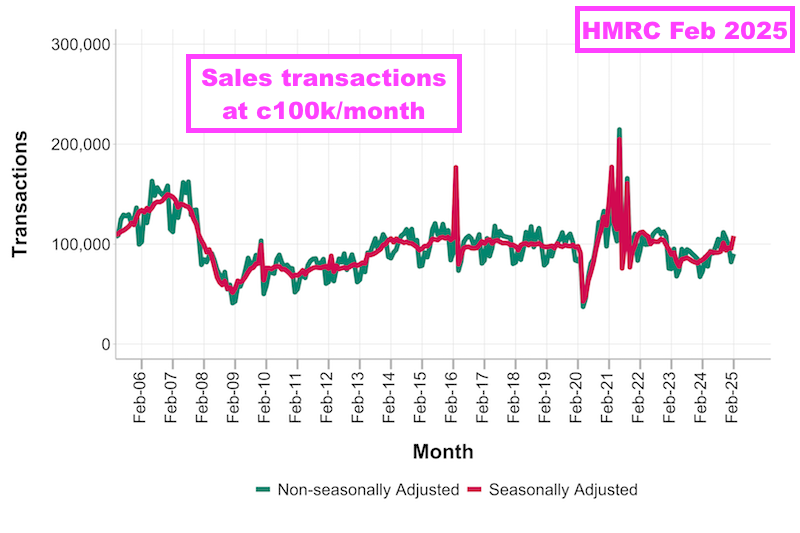
- This H1’s £14.5m network rental income set a new H1 record and was almost double the level recorded for H1 2014.
- Total H1 network income of £27.9m translated into H1 revenue of £5.1m, up 20%:
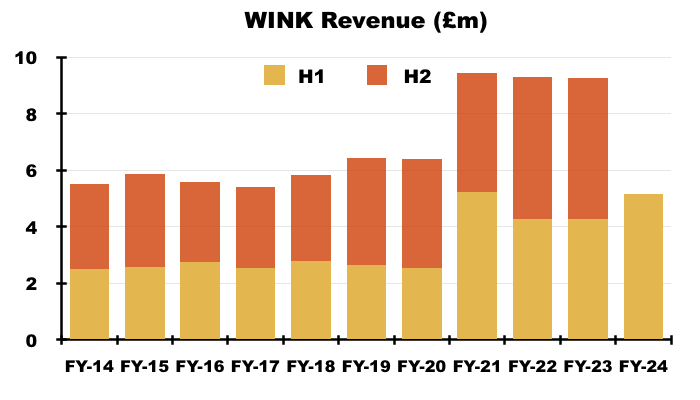
- Revenue growth at 20% outpaced the 6% advance to total network income due to:
- A “one-off large franchise-sale fee” of £350k (see Franchisees: network and competitive advantage), and;
- The company-owned offices reporting progress “above expectations” (see Company-owned offices).
- The £350k one-off fee helped H1 revenue from franchise-service fees increase 16% to £3.6m, while the positive efforts at the company-owned offices pushed their collective H1 sales 33% higher to £1.5m:
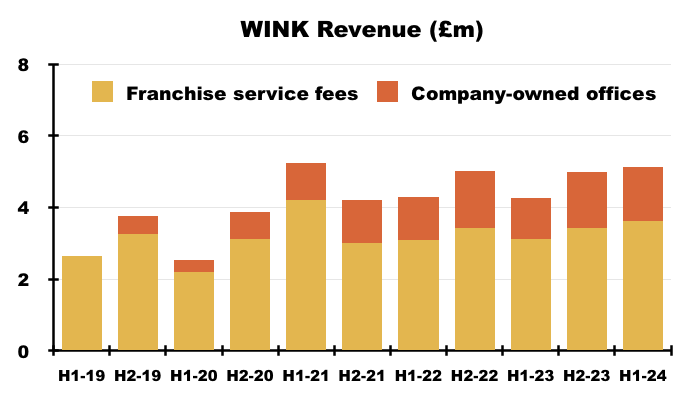
- Without the £350k one-off fee, H1 revenue from franchise-service fees would have increased 4% and total H1 revenue would have gained 12%.
- H1 operating profit tracked revenue higher and increased 24% to £1.0m:
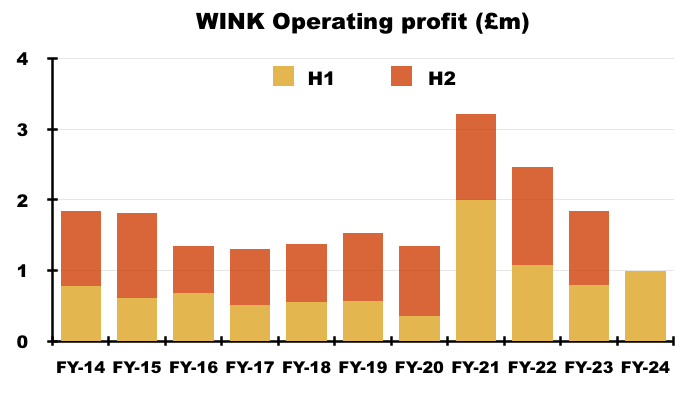
- Without the £350k one-off fee, H1 operating profit may have declined versus the comparable H1.
- Probable losses incurred by some of the company-owned offices possibly suppressed this H1’s reported profit (see Company-owned offices).
- This H1’s profit was not complicated by major adjustments, with non-trading charges limited to only a £1k investment gain.
- Last year’s Q1 2024 update and July’s Q2 2024 update had already revealed quarterly dividends of 3.0p per share, which improved the total H1 payout by 3% to 6.0p per share:
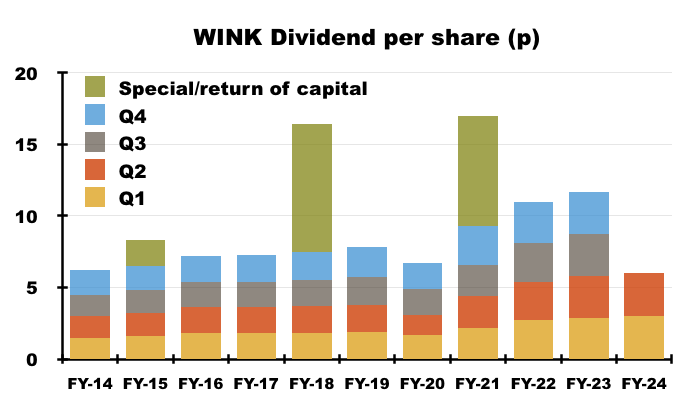
- Following this H1, WINK announced the following dividends:
- Q3 2024: 3p per share (+3%);
- Q4 2024: 3.3p per share (+10%), and;
- Q1 2025: 3.3p per share (+10%).
- These post-H1 dividends lifted the FY 2024 payout by 5% to 12.3p per share and implied the FY 2025 payout could increase by at least 7% to at least 13.2p per share (see Valuation).
Franchisees: network and competitive advantage
- WINK’s franchise network consists of 100 estate-agency branches located throughout London and affluent areas of southern England.
- Franchisees pay WINK a straight 8% of all of their sales and lettings income, plus variable sums towards IT, training, marketing, legal, compliance, landlord/tenant referrals and other services.
- While WINK’s basic 8% is fixed, the associated agent commissions to which the 8% is applied can vary… meaning WINK is not entirely in control of its own franchise-service fees.
- Indeed, board remarks during the 2016 AGM revealed WINK did not interfere with the commission rates charged by its franchisees to property vendors and landlords.
- During this H1, £3.6m, or 13.0%, of the £27.9m earned by the franchisees was taken by WINK as service fees:
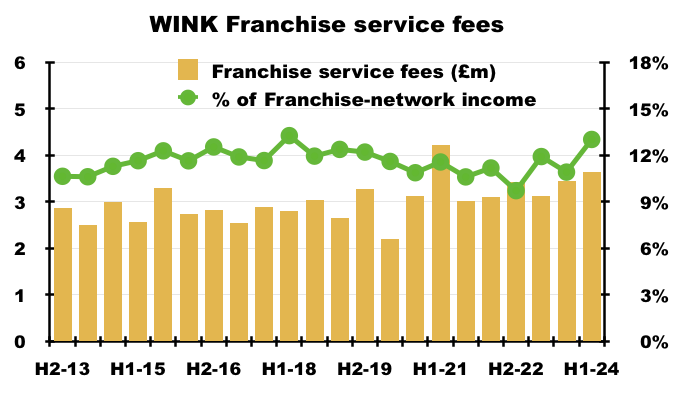
- The 13.0% proportion was the highest since H1 2018 (13.3%) and was bolstered by the aforementioned £350k “one-off large franchise-sale fee” disclosed during the H1 webinar:
“The franchising business increased revenue by £500k. The increase in sales and lettings generated £125k of additional income for us and we had a one-off large franchise sale fee, which meant that revenue line was up by £350k on the previous half year“.
- Without the £350k one-off fee, the 13.0% proportion would have been 11.7% — identical to the average H1 proportion between H1 2019 and the comparable H1 2023.
- I speculate the £350k one-off fee includes a settlement relating to the termination of the Battersea, Clapham and Pimlico franchisee agreements due to “compliance reasons” during FY 2022.
- The preceding FY explained how WINK’s competitive edge is based upon ensuring the franchisees provide a tip-top service to support a highly reputable brand:
[FY 2023] “The essence of Winkworth’s franchise proposition lies in its brand and reputation.
…
Winkworth places significant value on the integrity of its brand, upholding it through exemplary standards of ethics and business conduct in all interactions.
…
Winkworth strives to maintain a reputation for the highest standards of business conduct. The directors always endeavour to operate to the highest ethical standards in order to maintain and promote the reputation of the Company.
…
We have strong local market knowledge and expertise, both in London and in the country markets, and we commit to maintaining competitive fees while delivering unparalleled service to meet our customers’ needs.
…
We aim to expand our portfolio of rental properties by providing landlords with top-tier service…
…
Winkworth plans to remain competitive in the current market by operating a model that emphasises our premium, pro-active service…
…
With our people-based ethos and as a premium, customer-focussed business dependent on its reputation, we understand that our success depends on everyone working under the Winkworth brand doing so with respect, loyalty and pride. All our offices need to ensure we exceed our customers’ expectations by delivering the highest quality service at all times so that our customers not only return, but also share their experience with other potential customers.”
- As such, not everyone that applies to become a franchisee is successful:
[FY 2023] “Winkworth has a rigorous vetting procedure for new franchisees and only a small number of applicants are successful in joining the group. Once accepted, franchisees are closely monitored to make sure that they achieve the best practice service levels expected of them and remain compliant with the law. Winkworth provides regular training through it’s centralised in-house training academy, alongside which it runs regular compliance audits of franchisee offices, both remote and in-person.”
- Appointing higher-quality franchisees who consistently “appear in the top three in their local marketplace” helps ensure each branch can generate healthy commissions and — as this H1’s webinar stated — attain a “sustainable position… in any market“:
“What we try to do is provide a platform to enable an independent estate agency effectively to trade under our name and appear in the top three in their local marketplace. We aspire to be in the top three because we believe that’s a sustainable position for any estate agency in any market.”
- Network income per branch throughout this H1 and the preceding H2 was approximately £585k (£59.4m/101.5).
- That £585k compares to almost £200k per branch during FY 2009, nearly £500k during FY 2016, £590k during the preceding FY but £635k during FY 2021.
- The preceding FY’s webinar claimed a branch’s market share was more important than comparing its income to the network average:
[FY 2023] “[Gross franchisee income] varies hugely as to what is acceptable and what is not. A franchise in, say, Dartmouth has low costs but commensurately lower revenues. In central London costs are higher but revenue potential is high. To average it out is always difficult as it does not reflect either. But we can see what we can do with the transparency on that.
One size unfortunately doesn’t fit all, there isn’t one metric we could apply to all offices fairly. That’s why we look at market share per area because it’s fairer. If you’re within the top three in your area, with some exceptions, that is a sustainable place to be, but revenues will be very different for, say, Dartmouth compared to Chelsea.”
- Although WINK has never disclosed how many franchisees “appear in the top three in their local marketplace”, this H1’s webinar did reiterate branches do risk closure if they are “not performing” (see Franchisees: branch openings and closures):
“It’s important to say we’re not scared to close offices if we feel they are not performing or not working within the system as they should be, with a view that we’re confident to reopen them in due course and work with the ones that are successful to help them make better.“
- Statistics from this H1 showcased the greater effectiveness of the typical WINK franchisee versus nine other (anonymous) London estate agents:
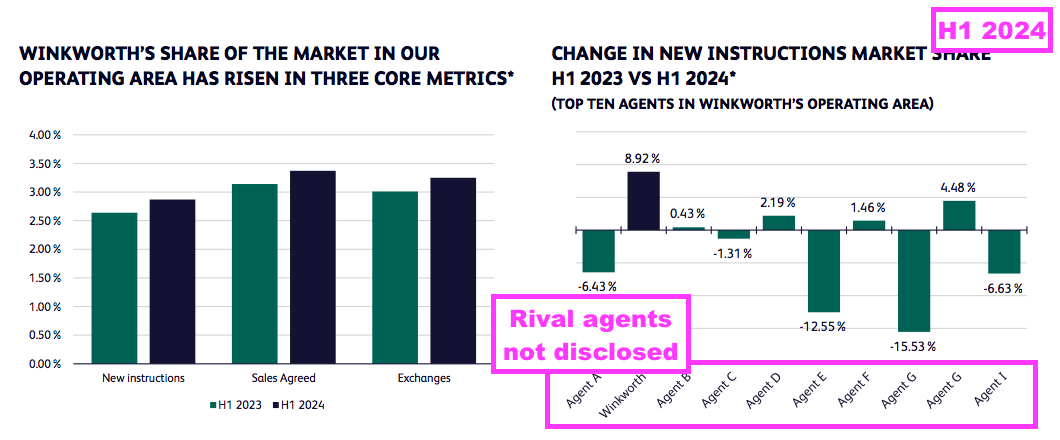
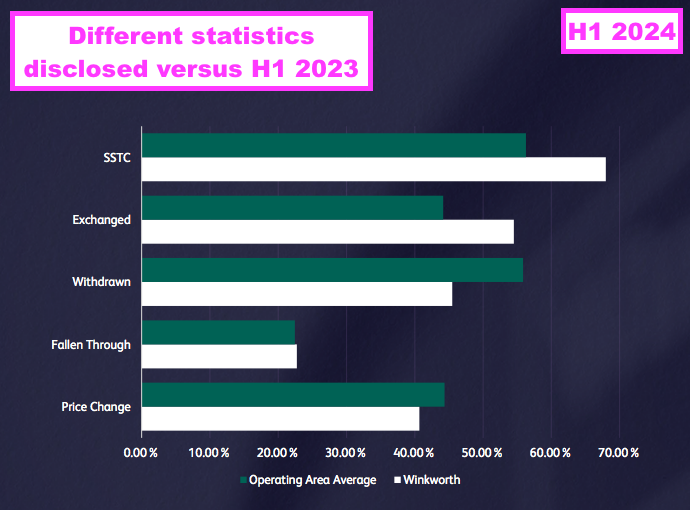
- Note the industry data published for this H1 differed to that published for the comparable H1.
- The comparable H1 for example disclosed the names of the nine rival agencies: Foxtons, Dexters, Kinleigh Falkard & Hayward, Savills, Hamptons, Chestertons, Knight Frank, Purplebricks.com and Barnard Marcus:
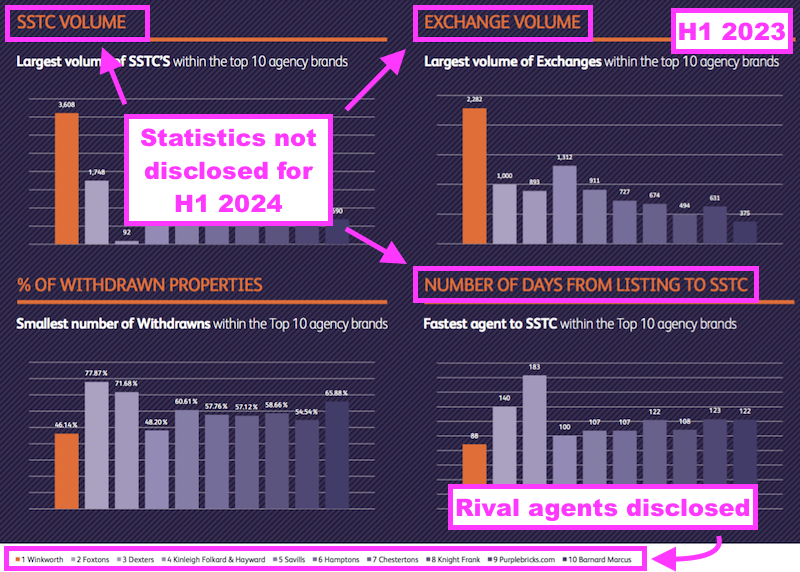
- The inconsistent reporting of industry data is not ideal, and could be due to the supplier of such data restricting its usage… or perhaps more likely, WINK just cherry-picking the most favourable stats.
- Indeed, this H1 referred to WINK’s superior instruction-to-exchange conversion among £1m-plus properties:
“We are proud of the fact that, according to the latest data, Winkworth has the highest conversion rate from new instruction to exchange of £1m+ homes of the top ten estate agents in London“.
- But for the comparable H1, WINK referred to its superior volume of sold-subject-to-contracts (SSTCs) and its superior number of exchanges:
[H1 2023] “We are pleased to be able to report that, in the areas in which we operate, Winkworth achieved the highest volume of SSTC of the top 10 operators in H1 2023 and the largest number of exchanges. In addition, we had the lowest number of properties withdrawn from sale and were the fastest agent in SSTC.”
- And for H1 2022, WINK simply said it sold more properties than all of its local rivals:
[H1 2022] “Overall, in H1 2022 we sold more properties than any other online or traditional agent in the postcodes that we cover.“
- WINK’s conversion of website visitors into valuation/enquiry/viewing leads has not obviously improved since H1 2016. Website visits have increased by 38% while the number of leads generated appears to have advanced by 37%:
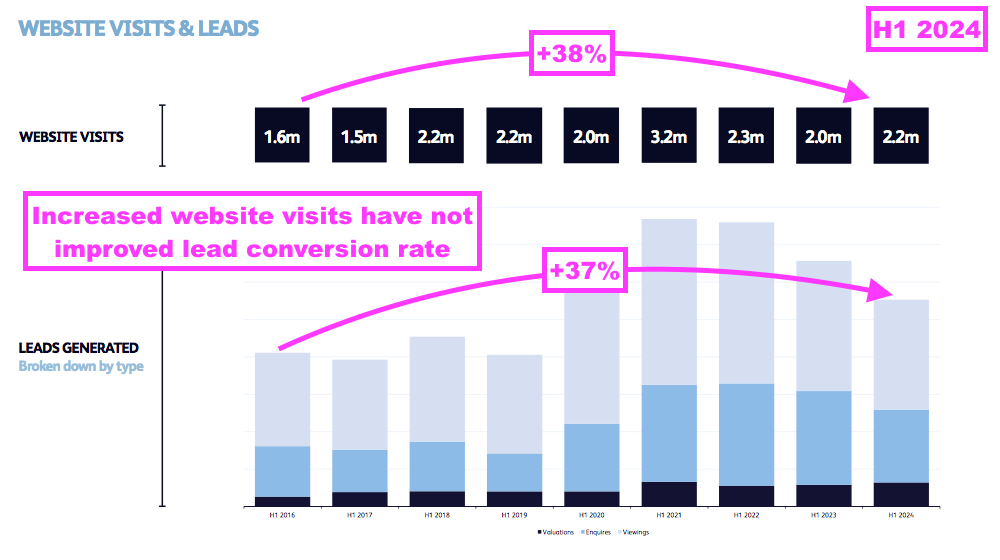
- Network income per website lead has not improved either. H1 network income climbed 18% from £23.6m to £27.9m between H1 2016 and this H1, implying H1 network income per lead has declined by approximately 14% (118%/137%) during the same period.
Franchisees: branch openings and closures
- Following the shutting of nine branches during the preceding FY, this H1 witnessed no closures:
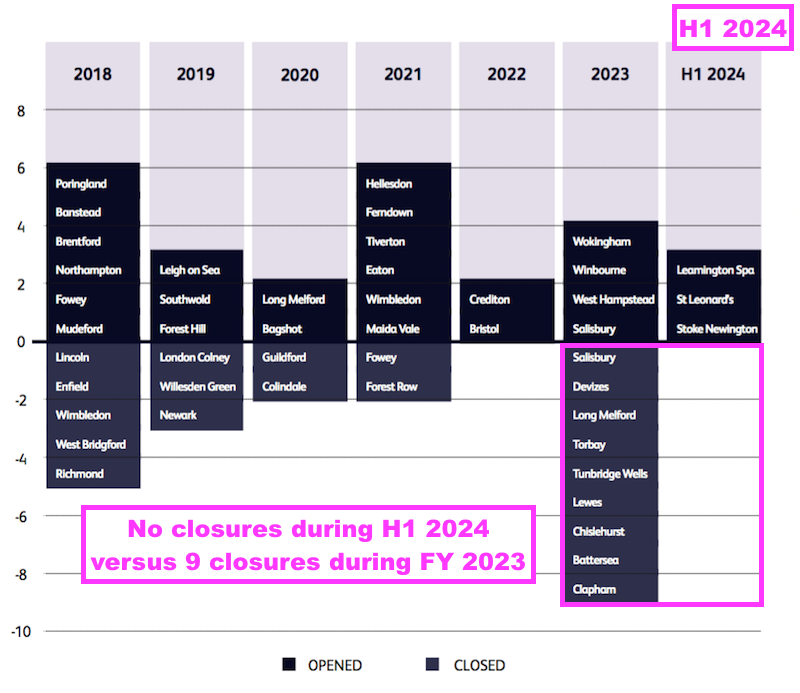
- Franchisees opened new branches in St Leonard’s, Leamington Spa and Stoke Newington during this H1, and another five are “in the pipeline“:
“We are on track to deliver on our annual target of eight new offices, having in H1 2024 already opened three and with a further five in the pipeline.”
- WINK notably re-franchised four existing branches during this H1, with another seven “under negotiation“:
“In addition, we re-franchised four offices in H1 2024 and have a further seven re-franchises under negotiation. Of this total of 12 new offices or talented new operators, it is planned that 9 will be in the London area.”
- The pace of new openings and re-franchisings appears to have increased of late. This H1’s five branches in the pipeline and seven re-franchises under negotiation compare to the preceding FY stating “up to eight new [London] franchisees” could join during 2024:
[FY 2023] “We have already opened three new offices this year in St Leonard’s, adding to our existing Exeter network through a supported acquisition, Leamington Spa and Stoke Newington. With up to eight new franchisees set to join our London network in 2024, and our portfolio management initiatives revitalising ambition and growth right across the business, we are excited by the outlook for the current year. “
- The H1 webinar claimed re-franchising certain branches could push their revenue to “far greater heights“:
“There is portfolio management, in which we’ve been accelerating our investment. We have a very established long-term business with lots of offices, and… some of our franchisees are reaching retirement having been the franchisees for 20-30 years.
There’s a significant opportunity to bring in talent that can push those businesses on to far greater heights and again generate a significant increases in the 8%. But more than that, generally they will then go on to open further offices or acquire further businesses and so that generates internal growth for us…
We are working hard at providing exits for existing franchisees and headhunting new talent.”
- The comparable H1 in fact claimed “new blood” could improve revenue from re-franchised offices in London by “three- of four-fold“:
[H1 2023] “In London, we have identified further opportunities to both introduce new blood to existing businesses and to significantly improve the sales performance of offices with strong underlying lettings businesses. We believe that in certain situations we may be able to increase the available franchise revenue three- or four-fold, the equivalent of opening multiple cold start offices.“
- Certainly the re-franchising of the Streatham and Herne Hill branches could yield very favourable results. This H1 confirmed the agent who revived WINK’s Tooting office was now “successfully running” those two particular branches (see Company-owned offices):
“The franchisee who we bought out of Tooting, for example, is now very successfully running Streatham and Herne Hill, having reinvested in these offices with some help from the Group.“
- Other WINK branches taking on “new blood” of late include Clapham, Knightsbridge, Hendon and Worthing.
- The franchisees taking on Hendon appear very able. This H1 indicated they had “doubled revenue since joining Winkworth in Kingsbury”:
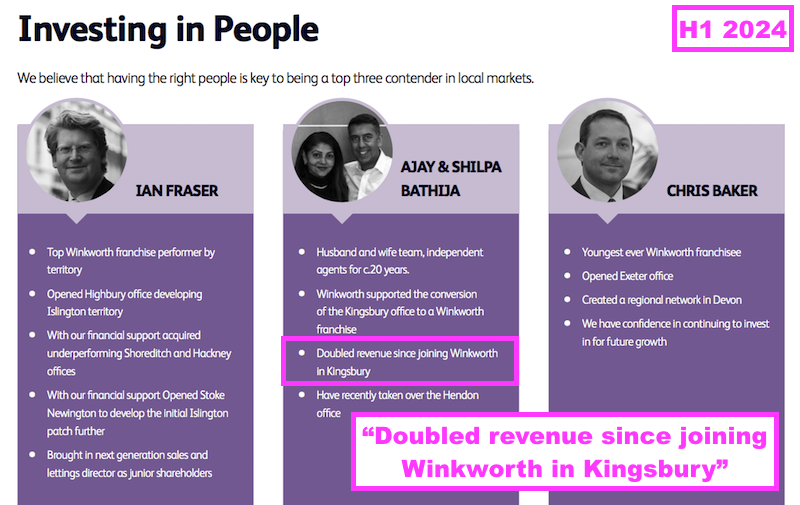
- WINK’s Kingsbury branch was opened during 2017:
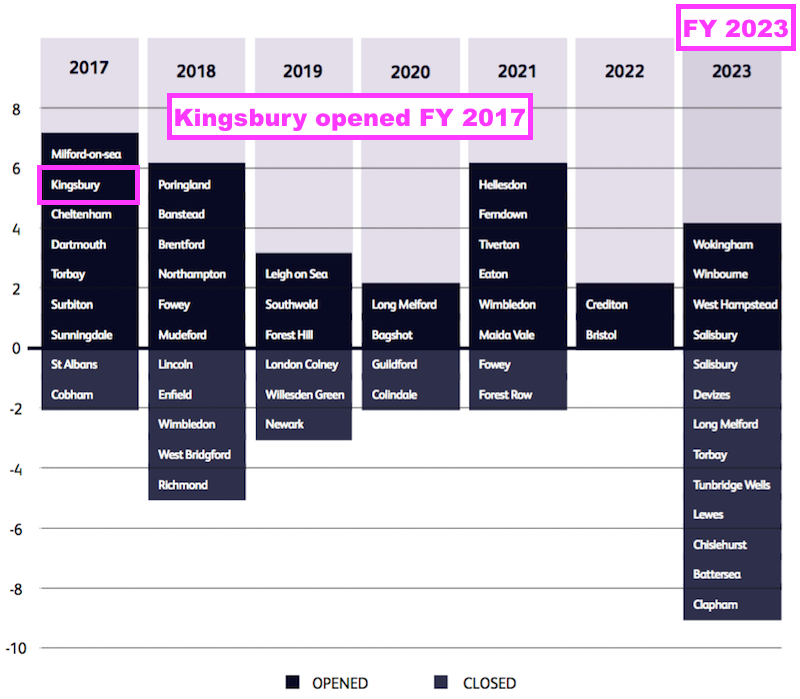
- This H1’s webinar referred to the preceding FY webinar and the following slide…
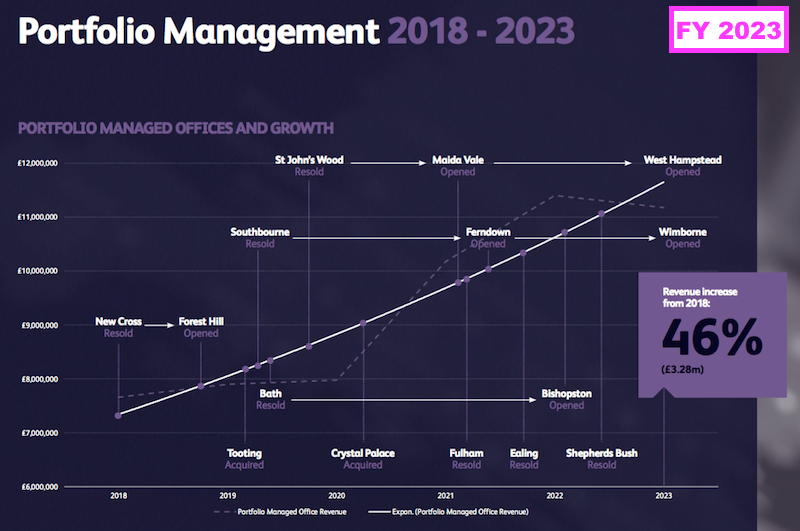
- … and claimed certain offices changing hands during 2018 had since lifted their annual income by a “substantial” £250k (a £250k improvement is indeed “substantial” given the aforementioned £585k income per branch).
- Branch re-franchising offers hope that WINK can lift revenue and profit without the constant need for franchisees to find new locations and establish market positions from scratch.
- The preceding FY said the target number of new branches was six per annum, but this H1 upped the target to eight:
“We are on track to deliver on our annual target of eight new offices, having in H1 2024 already opened three and with a further five in the pipeline.”
- Although 33 branches have been opened since FY 2017, some 23 have also been closed.
- Opening only a net ten new branches over 7.5 years underlines how WINK’s expansion is dependent entirely on the “availability of talent“. As this H1’s webinar reiterated:
“We remain very much a people-led business and the decisions we make are guided by the talent and the availability of talent that… come to us.“
- Presumably the 23 branch closures since FY 2017 emphasise an agent’s ‘talent’ may deteriorate over time.
- The 103 WINK locations operating during this H1 compare to 86 quoted within the 2009 flotation document and 94 quoted within the 2016 annual report.

Franchisees: sales and lettings income
- This H1 claimed “extended conveyancing times” caused the difference between the aforementioned c20% “sales agreed” progress within those two earlier statements and the actual 9% improvement to network sales income:
“Network sales revenue in H1 2024 was up by 9% on H1 2023, but sales agreed is a much stronger 21%, reflecting extended conveyancing times which will push much of this activity into H2 2024 completions.”
- WINK said “much of this [sales agreed] activity” ought to be recognised during the subsequent H2 2024.
- Mind you, an agreed sale is not a completed sale… and those earlier industry statistics did include a ‘fallen through’ rate of approximately 25%:
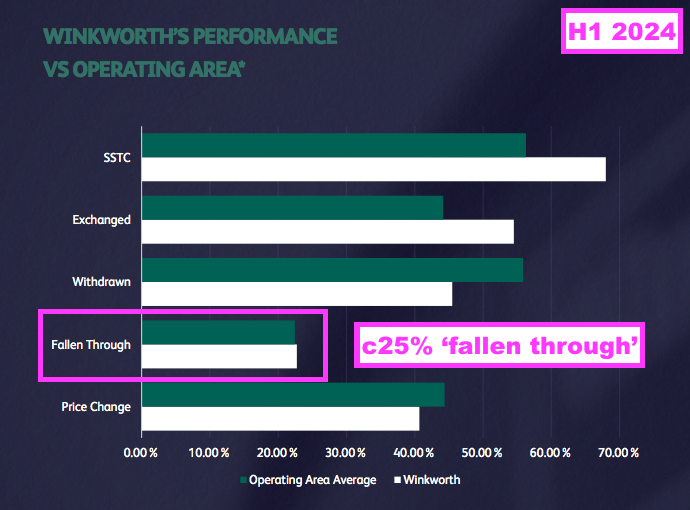
- The H1 webinar confirmed 75% of network revenue was generated by branches in London, and that the greater H1 sales income generated by franchisees occurred entirely within the capital:
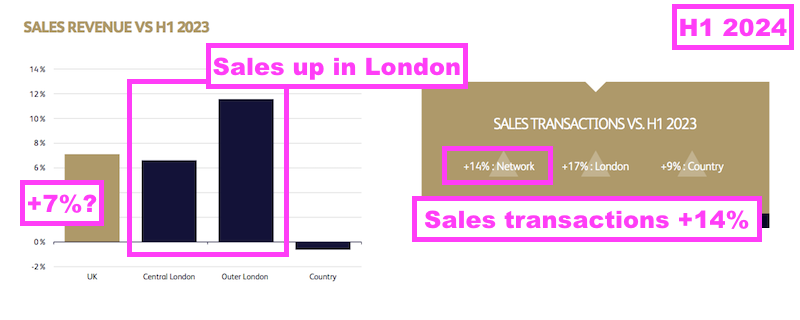
- I am not sure why WINK’s slide above shows H1 ‘UK’ sales revenue up 7% when H1 network sales income actually gained 9% to £13.4m.
- The slide above also states H1 network sales transactions increased by 14%…
- …which, given H1 network sales income gained 9%, implies the H1 commission per transaction declined by approximately 4%.
- Commission per transaction seemingly declined by approximately 2% during the preceding FY, too.
- The comparable H1 indicated agents earned an average sales commission of £5.4k from 2,282 exchanges (£12.3m/2,282):
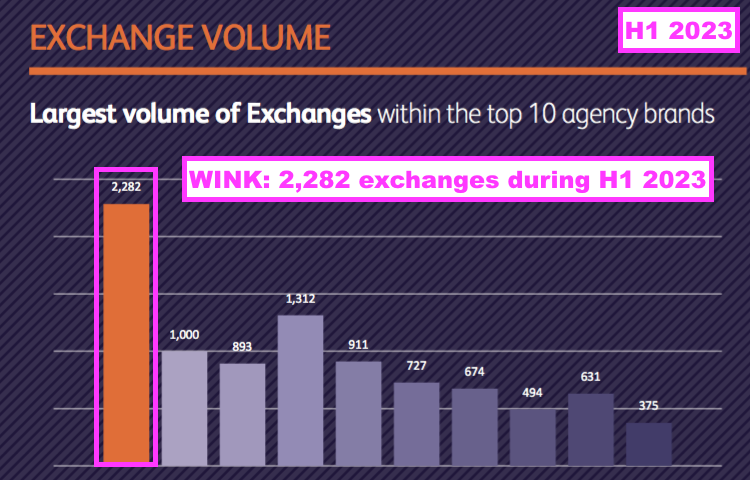
- This H1 did not divulge the number of exchanges, which prevented shareholders from deducing an exact average sales commission… and was perhaps further evidence of commission levels eroding.
- Note the preceding FY did admit “pressure on commissions may escalate“:
[FY 2023] “While the growth in market share of online estate agents appears to have stabilised, the emergence of innovative or discounted service models may exert pressure on commissions, potentially leading to reduced revenues for the company.
…
Risk: In a market with reduced trading activity, pressure on commissions may escalate, potentially resulting in lower earnings from fewer transactions. Specifically, Winkworth is vulnerable to shifts in the London market, as the majority of its revenue stems from franchisees concentrated in this region.
Management action: We have strong local market knowledge and expertise, both in London and in the country markets, and we commit to maintaining competitive fees while delivering unparalleled service to meet our customers’ needs.“
- This H1 confirmed the number of potential buyers per property for sale had remained at 7.5:
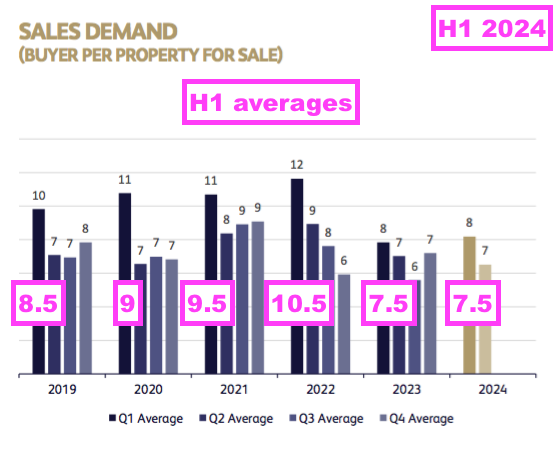
- Unchanged buyer demand therefore suggests greater supply supported the 9% advance to this H1’s network sales income:
“Despite interest rates remaining relatively high in the first half of this year, 2024 has to-date been very encouraging. An increase in sellers coming to the market has drawn out demand from buyers and this, combined with more positive economic news, has led to far better conditions than 2023, when uncertainty over the outlook for interest rates weighed on activity.”
- In contrast to network sales income, network lettings income performed better outside London:
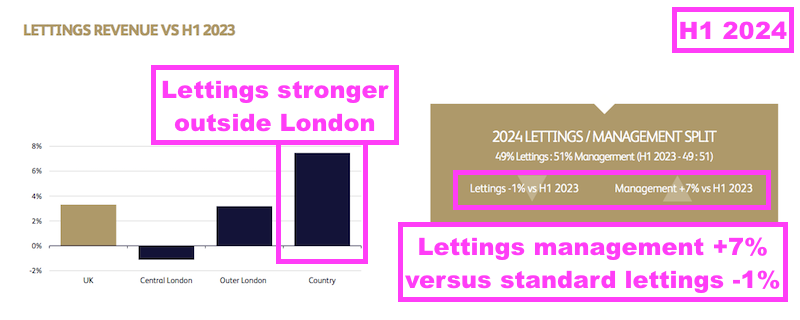
- H1 network lettings income gained 4% due entirely to more landlords employing WINK’s full property-management service, income from which gained 7%.
- In contrast, H1 network income generated through the standard lettings service for ‘hands-on’ landlords declined 1%.
- The number of potential tenants per property to let was 11 during this H1 — the lowest for an H1 since at least H1 2019:
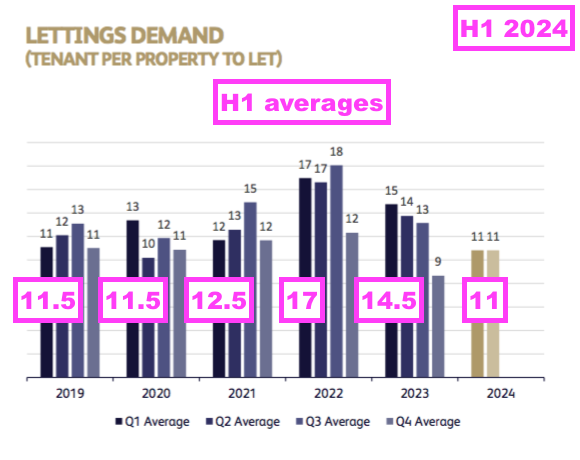
- Similar to the preceding FY, this H1 cited “affordability” reasons for the slower lettings progress:
“In line with the trend that started in August last year, lettings growth slowed, with network revenue up by 4% in H1 2024 but applicants 3% down on last year, as tenants hit affordability ceilings and the reversal of the move out of London to the country finally settled down, albeit with rental prices remaining at high levels. Our network growth in the country markets, where there is greater affordability, meant that lettings revenue there outperformed the network average, with growth of 8%.“
- The tone of this H1’s lettings commentary contrasted with that of the comparable H1, when properties to let attracted 14-15 potential tenants and competition among them was “extreme”:
[H1 2023] “With an ongoing reduction of supply in the private rental sector due to landlords exiting the market following increasing costs and proposed new changes in legislation, the competition for properties to rent continued to be extreme.”
- This H1’s sales-rental network split was 48%:52%:

- 52% is a historically high proportion for lettings. During the previous five H1s for example, the average sales-rental network split has been 52%/48%.
- This H1 indicated the sales-rental split would soon tip back towards sales:
“We expect the ratio of sales to rentals within our full year gross revenuestobe above the 48:52 ratio achieved in the first half of 2024 and the full year 2023.”
Winkworth versus Foxtons
- Foxtons (FOXT) claims to be “London’s leading estate agency” and remains as good a benchmark as any to assess WINK’s relative progress.
- FOXT experienced a better H1 2024 than WINK. FOXT’s H1 sales revenue advanced an impressive 28% while its H1 lettings revenue gained 5%:

- Note FOXT’s £13k average revenue per sales transaction.
- FOXT reportedly charges a standard 2.5% + VAT for sole agency status for selling a London property.
- Charging 2.5% + VAT as sales commission seems high, but all credit to FOXT for actually achieving 2.16% + VAT during this H1:
[FOXT H1 2024] “Average revenue per transaction was flat against 2023. The average price of properties sold (H1 2024: £581,000; 2023: £584,000) was flat in-line with the wider market, whilst commission rates remained robust at 2.16% (2023: 2.17%).“
- The chart below expresses WINK’s network sales, network lettings and total network income as percentages of the comparable FOXT revenue:
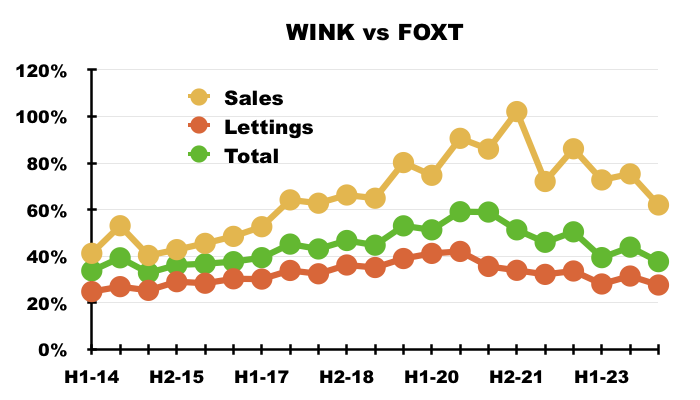
- The rising trends until FY 2021 indicate WINK’s self-employed franchisees handled London’s property market during Brexit and the pandemic far better than FOXT’s conventional employees…
- …although FOXT has improved its performance markedly versus WINK since FY 2022.
- FOXT’s improvement is linked to the 2022 appointment of a new chief executive, who instigated a number of initiatives to revitalise the group:
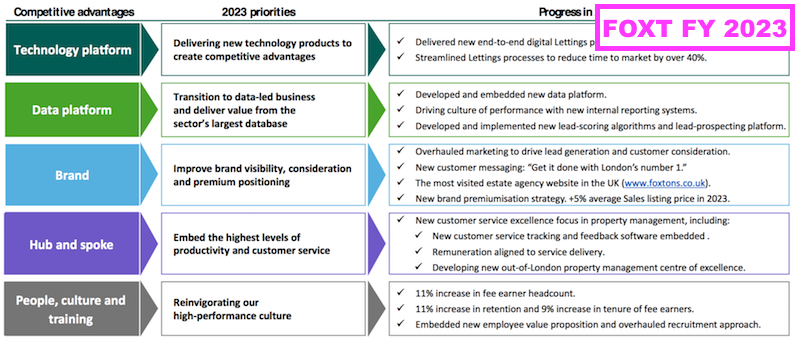
- FOXT’s adjusted operating profit for this H1 was £8.5m (+25%) and the new boss said the annual “medium-term target“ remained £25m-£30m:
[FOXT H1 2024] “Through continued market outperformance, the Group’s expectations for the full year remain unchanged and is on-track to deliver its medium-term target of £25m to £30m adjusted operating profit.”
- Meeting that £25m-£30m ambition could mean FOXT becomes very focused on taking market share from WINK and other London agents.
- FOXT’s H1 2024 provided two useful charts on the London property market.
- Transaction volumes at c40,000 during this H1 confirm the capital’s static housing activity:
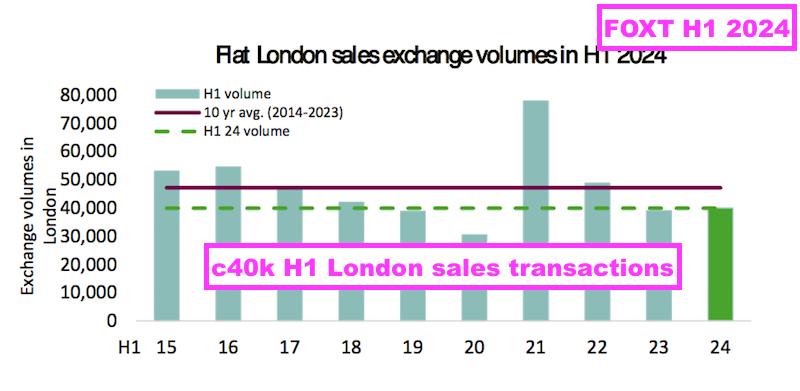
- Weekly rents within the capital have meanwhile advanced by 26% between H1 2019 and this H1:
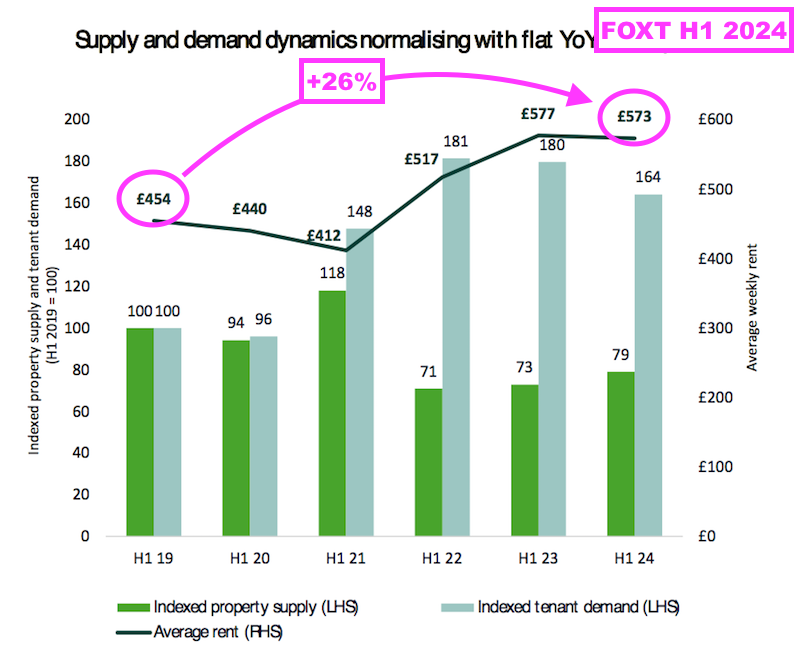
- FOXT’s charts could suggest any growth exhibited by WINK over time has been supported mostly by higher property prices and rents rather than increased market share.
- For example, WINK’s network lettings income between H1 2019 and this H1 advanced 27% (from £11.4m to £14.5m) to almost match the 26% average rent increase in that FOXT lettings chart.
- Note that comparing WINK against FOXT is not strictly like-for-like. FOXT generates almost all of its revenue from locations within London while WINK’s franchisees have historically generated approximately 80% from the capital and for this H1 generated 75%.
- Further distortion may be caused by FOXT and WINK acquiring and/or selling businesses. FOXT also earns revenue from interest on client lettings deposits (an extra £1.1m during this H1 2024).
- FOXT’s revitalised leadership could nonetheless leave WINK continuing to face stiffer competition, and may even have prompted WINK to re-franchise some of those four branches during this H1 (see Franchisees: branch openings and closures).
- Indeed, FOXT’s market share of exchanges has advanced from 3.3% during H1 2022 to 3.8% during H1 2023 to 5.1% during this H1.
- WINK meanwhile only referred to its market-share improvement of “sales agreed” from 2019 during this H1:
“We were pleased to note that this latest increase in activity meant that, since 2019, our national market share for sales agreed has grown by 36%”
- The implication perhaps of referring to “sales agreed” over five years is WINK’s market share of actual exchanges during recent years has not been as favourable.

Company-owned offices
- WINK presently operates three company-owned offices:
- Tooting, acquired during FY 2019 for almost £300k;
- Crystal Palace, acquired during FY 2020 for zero, and;
- Pimlico, acquired during FY 2023 for zero.
- The preceding FY repeated how the company-owned offices supply WINK with greater “front-end” insight:
[FY 2023] “As with the acquisitions of Tooting Estates Limited and Crystal Palace Estates Limited, Lumley 1 Limited [Pimlico] will keep Winkworth in touch with and learning from front-end experiences and industry trends. It will also provide a live platform to test and develop future digital initiatives and evolve our centralised CRM systems, which will be of benefit to all our franchisees.”
- But WINK’s webinars have regularly suggested the purchases are driven more by improving lacklustre branches through talented agents. For example, the preceding FY’s webinar said:
[FY 2023] “The agenda we started with these offices was to bring people in who are really good at what they do, but don’t have the money [to launch their own franchise]. We are a franchise business and the better the people we have, the better our 8%, and we want to maintain our model as a franchise business.”
- And this H1’s webinar confirmed Tooting was a “poor underperforming office” before WINK took operational control:
“Tooting is an area where we identified a huge amount of transactions and we had a poor underperforming office, I should say with a franchisee keen to exit. By… acquiring it with Charlie Mitchell, our partner in the venture, he grew that revenue to £1.6m during the boom of 2021.”
- Tooting certainly has been a successful turnaround. A new manager took charge during FY 2018 and the preceding FY’s webinar claimed he had lifted Tooting revenue from £200k to £1.6m by FY 2023:
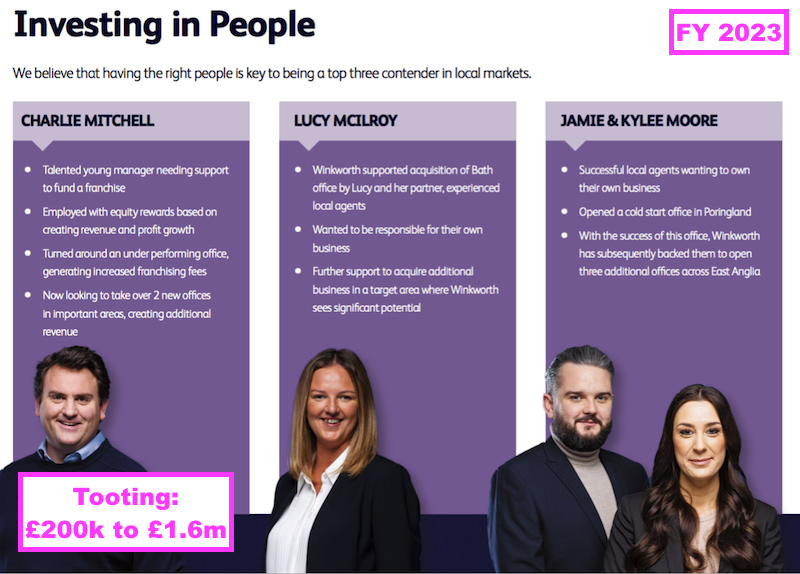
- As noted earlier, the manager responsible for Tooting’s turnaround recently left to become the franchisee for Streatham and Herne Hill:
“The franchisee who we bought out of Tooting, for example, is now very successfully running Streatham and Herne Hill, having reinvested in these offices with some help from the Group.”
- As well as “front-end” insight and turnaround potential, company-owned offices are now viewed as “training grounds” for would-be franchisees. This H1 said:
“Our equity-owned offices have expanded, and we are targeting good profitability from all four businesses in 2025. I have confidence that these offices are increasingly providing not only an important financial contribution to the Group, but also training grounds for future franchisees.“
- This H1’s webinar was hazy as to whether Tooting would always remain a “training ground” or would one day become controlled by a franchisee:
“We’ve brought in new management that we’re very happy in Tooting and in due course we will be talking to them about their aspirations.
People have different choices. Some people like to work with us and if that’s a successful partnership and they want to continue to work with us behind them then we’re happy with that. But if their route is to have their own office then either we’ll talk about the venture we’re in or others to ensure they can they can fulfil their ambitions.”
- The upshot perhaps is that the trio of company-owned offices may become permanent “training grounds“, whereby up-and-coming agents take charge, become successful and then move onto their own franchised branches…
- …leaving the financial performances of the three offices to become somewhat unpredictable as replacement up-and-coming agents are recruited every few years.
- This H1’s “training ground” comment contradicted the preceding FY’s webinar, which made clear the company-owned offices were not long-term investments:
[FY 2023] “The game is not to be long-term owners of these businesses. It is to bring the talent in, boost revenue opportunities from key markets where there are high revenue opportunities and once you have that 8% going for 20 years we can move our resources to the next place.”
- Whether the three company-owned offices become permanent “training grounds” or not might become academic if they all showed the early financial returns of the Tooting office.
- To recap, WINK purchased 55% of the Tooting office for £22.5k during FY 2019. A further £137k was spent purchasing an extra 35% during FY 2021 and another £137k was spent purchasing the final 10% during the preceding FY.
- Tooting’s earnings during FYs 2021 and 2022 exceeded £300k…
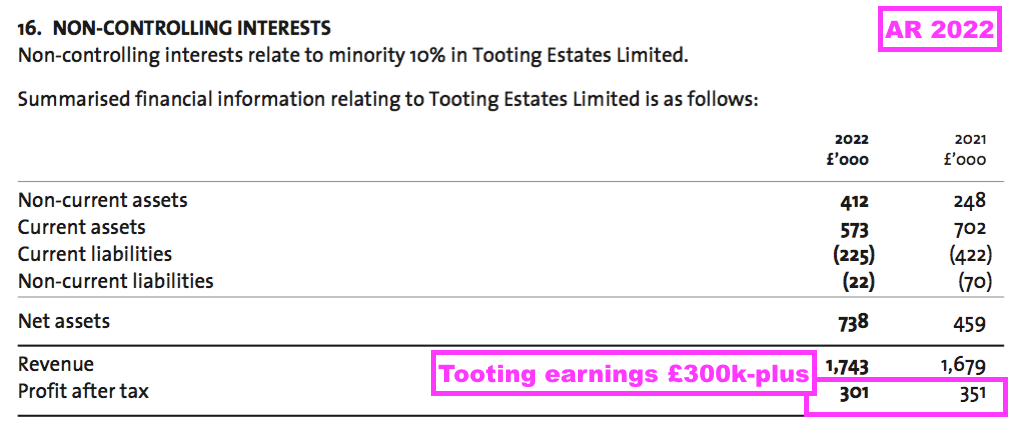
- …which is an exceptional return on the £300k or so spent acquiring the office.
- Companies House shows Tooting reporting a £296k pre-tax profit and £222k earnings for the preceding FY:
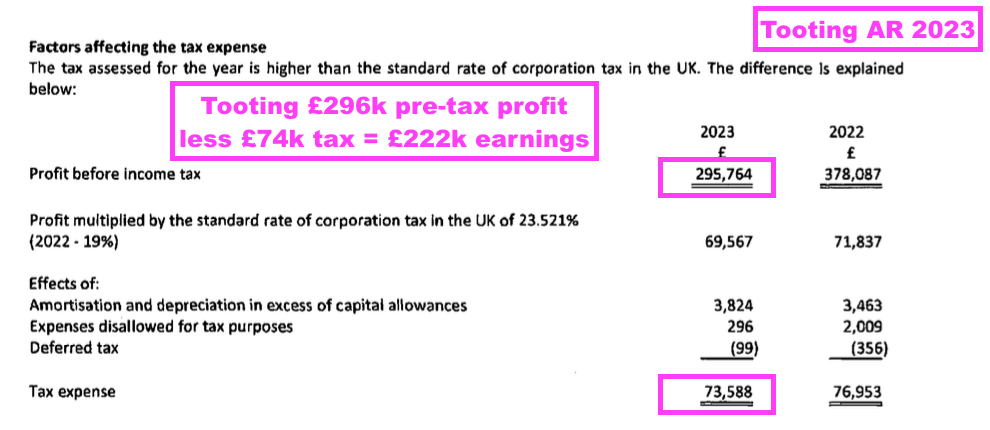
- WINK’s final 10% Tooting purchase valued the office at £1.4m, or 6x its £222k earnings.
- Tooting’s £222k earnings during the preceding FY supported 13% of the group’s £1.7m total FY earnings.
- In contrast to Tooting, Crystal Palace has yet to reach profitability:
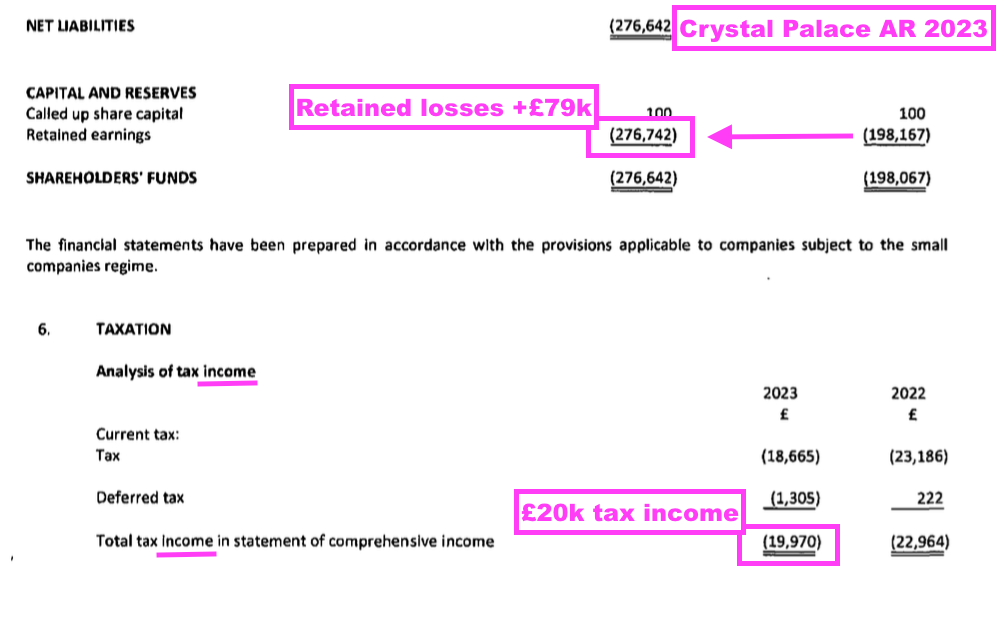
- Companies House indicates Crystal Palace may have suffered an approximate £99k operating loss during the preceding FY given the accounts show retained losses up £79k and a £20k tax credit. The accounts for FY 2022 suggest an approximate £131k operating loss.
- The preceding FY (and Companies House) confirmed Pimlico incurred an £82k pre-tax loss during its first ten weeks of WINK ownership:

- The trio of WINK-owned offices is complemented by the group’s in-house Development and Commercial Investment (DCI) agency, which handles sales of new builds and commercial properties.
- Companies House reveals DCI suffered a £245k loss during the preceding FY:
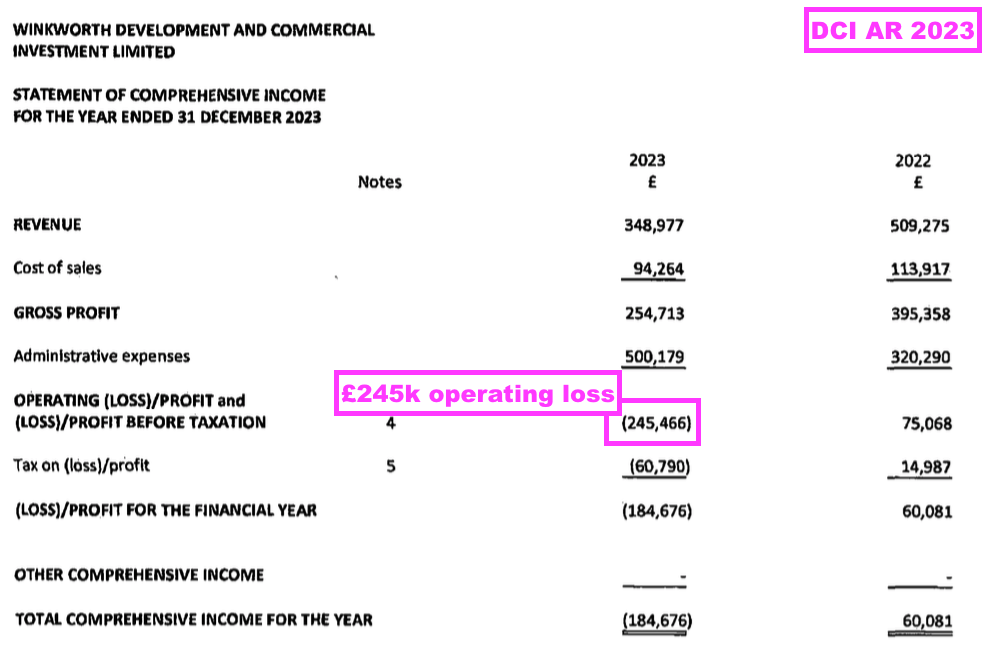
- Although the preceding FY disclosed the collective pre-tax profit of the group’s four company-owned offices to be £480k…
[FY 2023] “The Winkworth-owned offices, Tooting Estates Limited, Crystal Place Estates Limited, the newly acquired Lumley 1 Limited and Winkworth Development and Commercial Investment Limited, contributed revenue of £2.69 million (2022: £2.78 million) and £0.48 million (2022: £0.57 million) of profit before tax.“
- …I am now quite sure this £480k was gross profit, as per the accompanying FY presentation:
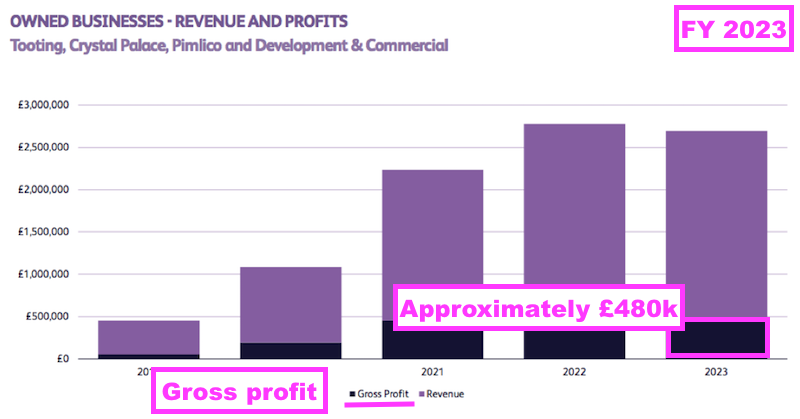
- This H1 suggested recent trading at Tooting, Crystal Palace and DCI was “above expectations“:
“Our entrepreneurial manager partnerships at our equity-owned offices have continued to grow their market share and revenue contribution, with progress in three out of four of our ventures being above expectations. New management in the fourth has now settled in and this change is expected to bear fruit in 2025.”
- This H1’s webinar spotlighted DCI, which seemingly almost doubled its revenue during the six months:
“Our development and commercial business generated almost £400k of revenue in H1 of 2024, up from about £200k last year on the back of some strong new-homes sales and a slight uptick in the commercial market.”
- The extra DCI income plus a full six-month contribution from Pimlico helped total H1 company-owned office revenue gain 33% to £1.5m:
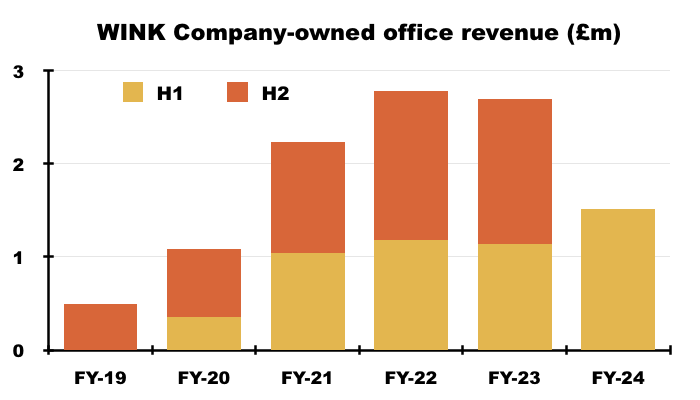
- Revenue from company-owned offices represented 29% of total revenue during this H1, versus 27% for the comparable H1 and 28% for H1 2022.
- A significant remark within this H1 was the targeting of “good profitability” from all four company-owned offices for FY 2025:
“Our equity-owned offices have expanded, and we are targeting good profitability from all four businesses in 2025.“
- “Good profitability” at Pimlico during FY 2025 will be very impressive; WINK took on the office during FY 2023 and the H1 webinar said an office turnaround takes three years:
“We are investing up front in Pimlico and we expect it to make a loss this year. It will then start trading profitably and we expect it to take roughly three years for an operator to turn the business around.“
- Turnarounds taking three years implies Crystal Palace really ought to become profitable very soon. Social media indicates Crystal Palace’s current manager has been in place since February 2022.
- Crystal Palace may in fact take longer to turn around than Pimlico.
- The value of the intangible ‘customer lists’ acquired at Tooting (£496k), Crystal Palace (£147k) and Pimlico (£336k) indicates Crystal Palace operated at half the revenue of Pimlico and a third of the revenue of Tooting at the time of their respective purchases by WINK (customer lists are valued based on the respective office’s historic revenue (point 20)).
- Should Crystal Palace, Pimlico and DCI ever sustain long-term “good profitability“, WINK’s return on these investments should be superb given the first two were acquired for zero and the latter was established internally.
- Mind you, the combined economics of the company-owned offices do not seem great at present.
- Indeed, this H1’s webinar noted the company-owned offices may have increased their costs by approximately £400k during the six months:
“Cost of sales were up £100k, again basically driven by the owned offices with the growth in Pimlico and revenue growth from the development and commercial business… Admin expenses were up just under £600k, with £330k relating to the owned offices and about £250k to the franchising business.“
- Company-owned office costs up by £400k would match this H1’s increase to company-owned office revenue!
- Although WINK’s long-term profitability has been dependent on the group’s main franchising division (see Financials)…
- …the company-owned offices do offer the group greater opportunity to influence earnings directly rather than rely on franchisees…
- …and could prove particularly valuable, especially if Crystal Palace, Pimlico and DCI can repeat the success of Tooting.
Boardroom
- WINK is run by the Agace family, with Simon Agace acting as non-executive chairman and his son Dominic Agace performing the role of chief executive.
- Simon Agace bought WINK during 1974 and began converting the then chain of eight company-owned offices into franchises during 1981. Dominic Agace joined WINK during 2001 and became chief executive during 2006.
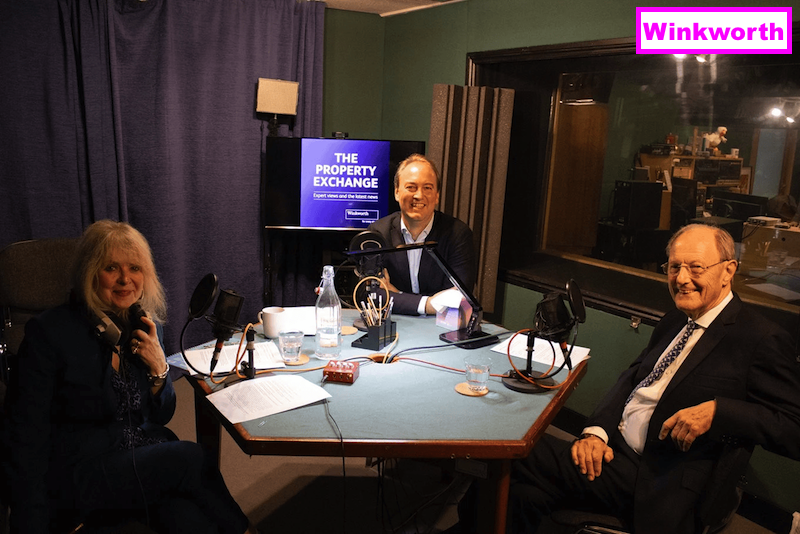
- Simon Agace still retains a 41%/£10.6m shareholding, while Dominic Agace holds a 6%/£1.5m stake.
- As demonstrated by the franchise network increasing by just a net ten branches since FY 2017 (see Franchisees: branch openings and closures), the Agaces have adopted a cautious approach to expansion:
[FY 2023] “Winkworth looks to grow its franchise network and add like-minded entrepreneurial franchisees and offices to the network. Not, however, through growth at any cost, as new franchisees need to adhere to the Winkworth brand values. We also have a conservative approach to financing expansion.”
- The Agaces have arguably prioritised income over growth, with the ten years to FY 2023 witnessing approximately 85% of reported earnings distributed through dividends or a return of capital (see Financials):
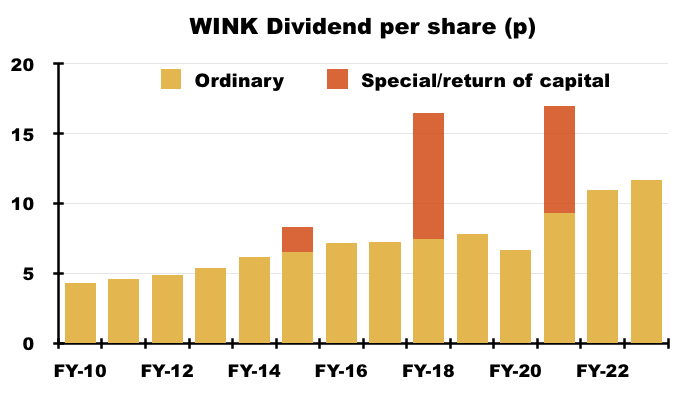
- The “conservative approach to financing” is meanwhile reflected by the group carrying net cash since FY 2008 (see Financials).
- WINK’s board has witnessed several changes of late.
- A third executive — the group’s long-term legal counsel — was appointed to the board last year “to offer better protection to Winkworth and its franchisees in a competitive industry facing increasing regulation” (point 1).
- More intriguing were last year’s two new non-executives, both of whom work as business consultants with M&A knowledge:
[RNS June 2024] “Tom Fyson is a Managing Director of Blackdown Partners, an independent advisory firm providing public and private businesses with advice on corporate finance, M&A, capital markets, investor relations and strategy. He brings over 20 years of financial experience, having begun his career at KPMG, where he qualified as a chartered accountant, before moving into corporate finance in 2006.
Jonathan Adams spent 14 years in M&A and as an equity analyst at JPMorgan before working as a global fund manager, initially at Citigroup and, subsequently, for 16 years at Investec. In 2022, he founded Butterwalk Advisory LLP, providing advice to, and investing directly in, small cap companies. He is a Senior Advisory Board Member to King’s College Cambridge’s Entrepreneurship Lab, a privately funded body with the goal of increasing awareness of entrepreneurship amongst its student membership.“
- This H1’s webinar claimed the M&A non-execs were appointed to help WINK “go forward more dynamically”:
“They are extremely successful individuals who will significantly help the company in all of our strategy. It places the company in a good stead to go forward more dynamically. Obviously we wouldn’t want to talk about individual situations or plans, but it really is part of the natural evolution of the board as we bring in new talent to ensure that we can do our best to push the company forward, aligned with the vision and values we hold dear.”
- The board now consists of the chairman, the chief exec, the finance director, the legal counsel and the two M&A non-execs after the retirement of a veteran non-exec and the death of another veteran non-exec (point 5b).
- Board pay is worth monitoring. Despite underlying operating profit sliding 25% to £1.8m during the preceding FY, total director remuneration climbed 12% to £601k:
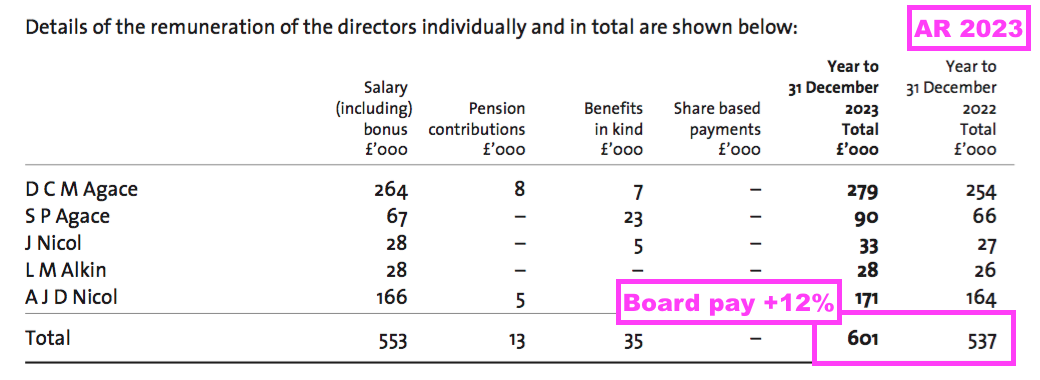
- Note that total board pay was £330k during FY 2015 when operating profit was also £1.8m:
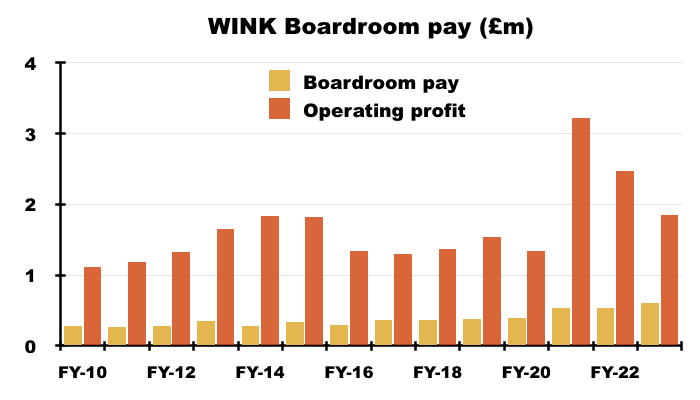
- True, shareholders have seen their ordinary dividends advance in line with total board pay between FY 2015 and the preceding FY (+80% versus +82%).
- But increases to board pay now appear to have a greater influence on WINK’s overall profitability than they did in the past.
Financials
- Despite the aforementioned losses at Crystal Palace, Pimlico and DCI, this H1 still converted a healthy 19% of revenue into profit:
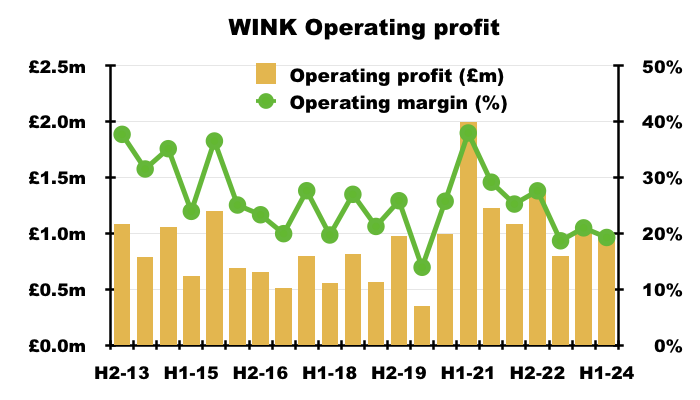
- For perspective, the average FY margin between FYs 2009 and 2018 — during which WINK operated as a pure franchisor — was a very appealing 29%:
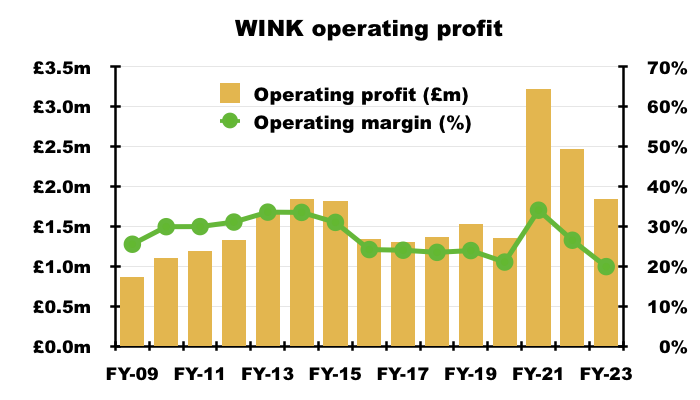
- Indeed, Companies House shows WINK’s main Winkworth Franchising subsidiary earning a 31% operating margin during the preceding FY:
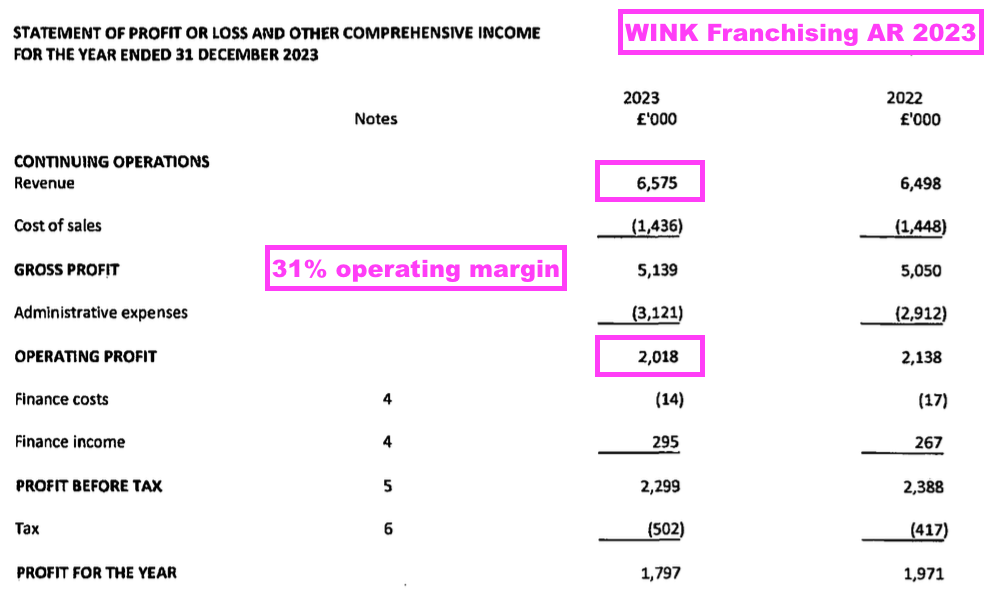
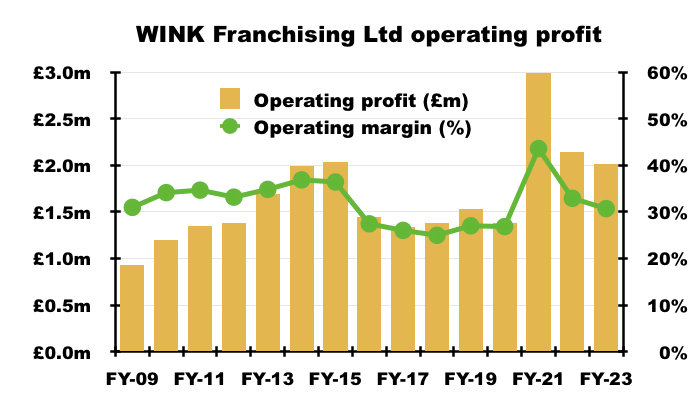
- This H1 hinted that greater IT and regulatory costs could restrict near-term margins within the main franchising subsidiary:
“This year we have focused on evolving the business, with the appointment of a new executive director to the board and two new non-executives. In addition, we have increased investment into our digital know-how and new business teams to expedite growth, prepare for potential legislative changes and deliver on digital projects to future-proof our business.
We believe that these increases in costs will deliver greater revenue growth in the medium term.“
- I trust these extra IT and regulatory costs can be counterbalanced by “good profitability” at Crystal Palace, Pimlico and DCI.
- I still maintain WINK should disclose the profitability of its two divisions within the accounting notes. Such disclosure would provide shareholders greater insight into the group’s progress and valuation (see Valuation):
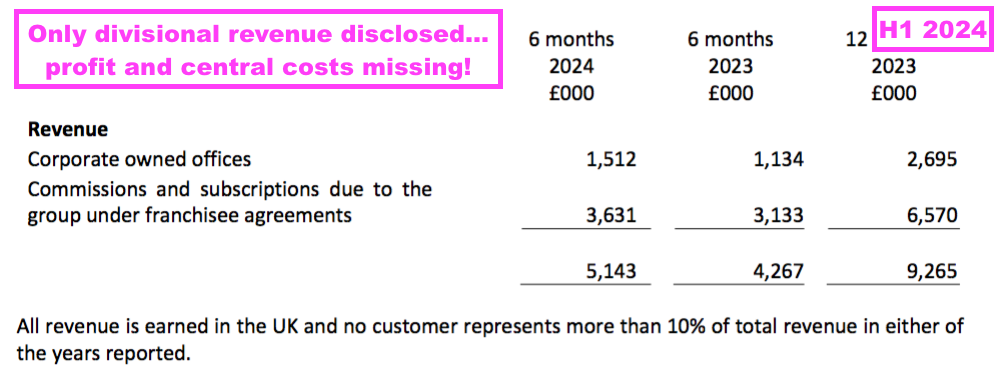
- H1 cash conversion appeared adequate despite reported earnings of £757k translating into free cash flow of only £294k.
- The £463k difference between earnings and free cash was due mostly to an adverse £419k working-capital movement:
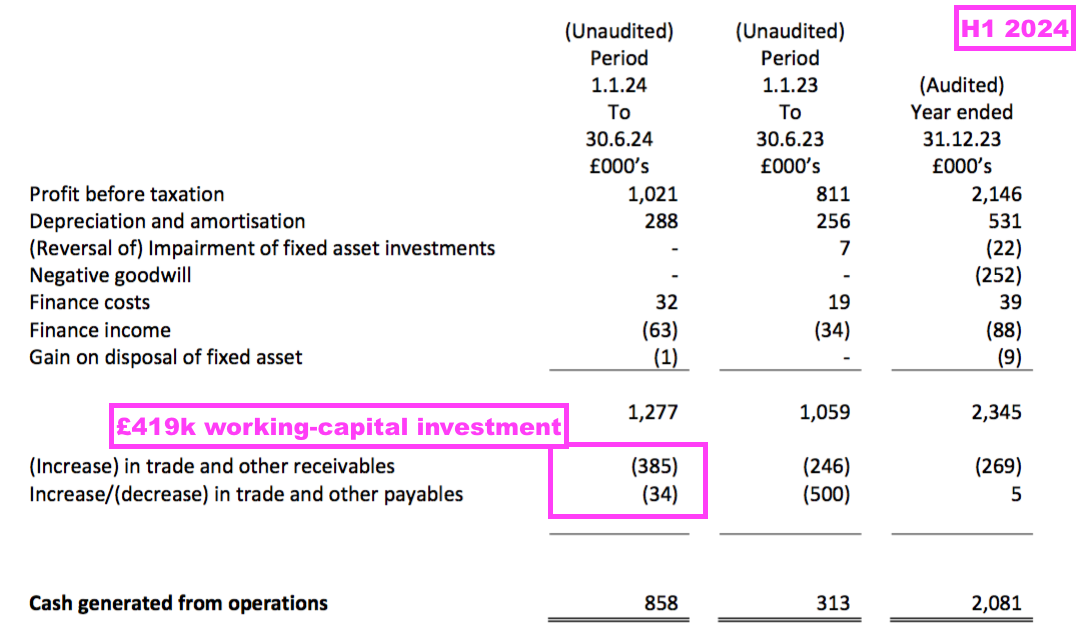
- WINK’s working capital includes loans to franchisees, which during this H1 increased by £367k to £949k:
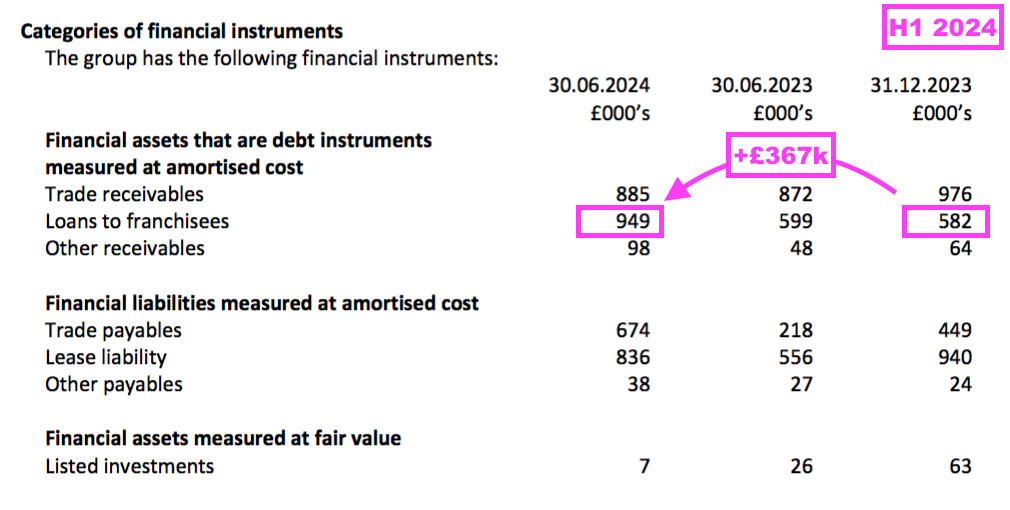
- This H1’s adverse working-capital movement was therefore due to WINK issuing more loans to franchisees, rather than franchisees becoming slower to pay WINK their 8% service fees.
- Loans to franchisees are now split £256k due within one year and £693k due after one year:
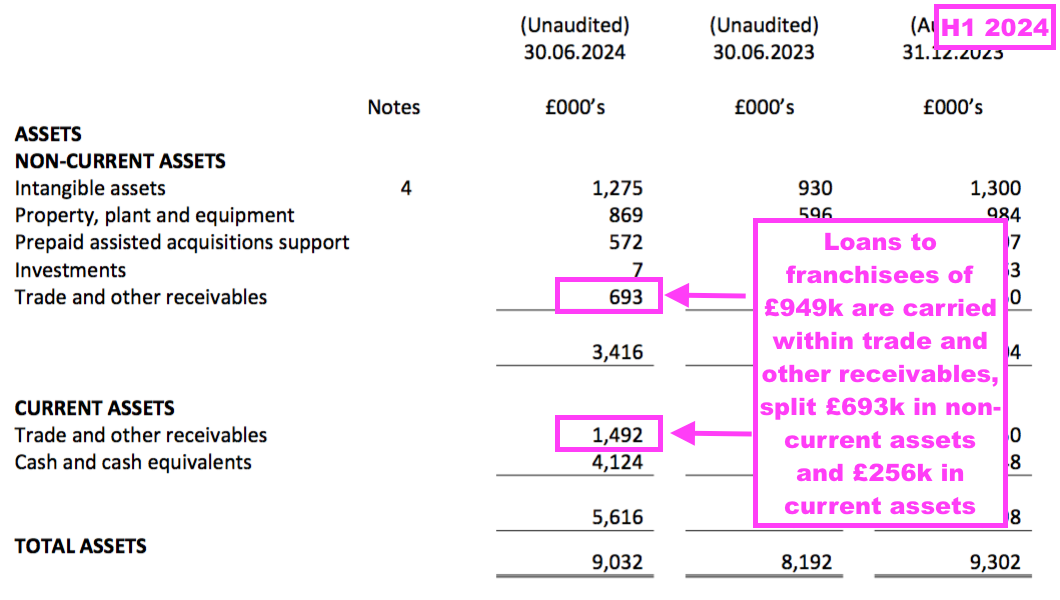
- I am not sure whether greater loans to franchisees are good or bad. They may signal greater expansion potential ahead…or they could mean would-be franchisees are now more likely to be tight for cash through a lack of prior success:
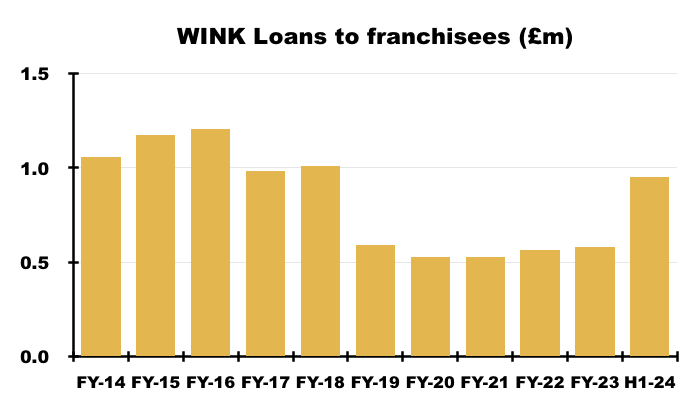
- Free cash flow of £294k plus an investment disposal of £57k less a dividend payment of £775k left H1 cash £424k lighter at £4,124k.
- Note that the H1 £775k dividend payment exceeded H1 reported earnings of £759k.
- However, WINK’s dividend cover has generally been low. Between FYs 2014 and 2023 for example, WINK reported aggregate earnings of 118p per share of which 100p per share (85%) were distributed to shareholders through dividends or a return of capital:
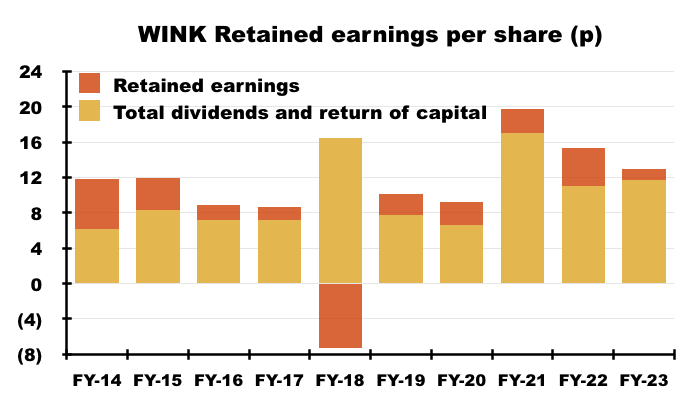
- Cash has consistently topped £4m since FY 2020 and remains reassuringly significant at 41% of trailing twelve-month revenue:
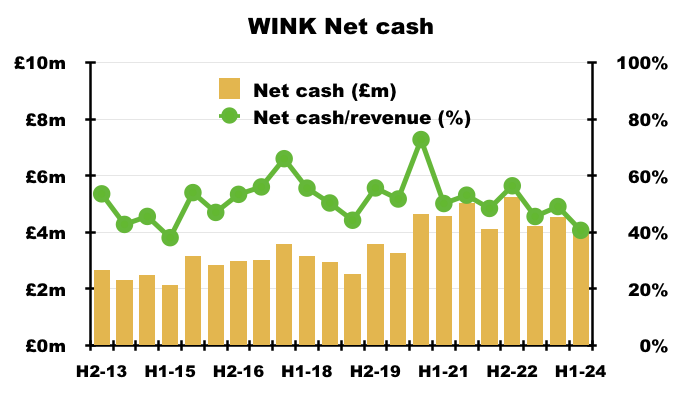
- WINK’s balance sheet remains free of bank debt and defined-benefit pension obligations.
- Intangible balance-sheet items consist of capitalised website costs (£521k), the aforementioned ‘customer lists’ acquired with Tooting, Crystal Palace and Pimlico (£754k) (see Company-owned offices) and ‘assisted acquisitions support’ (£572k), all of which has still to be amortised through the income statement:
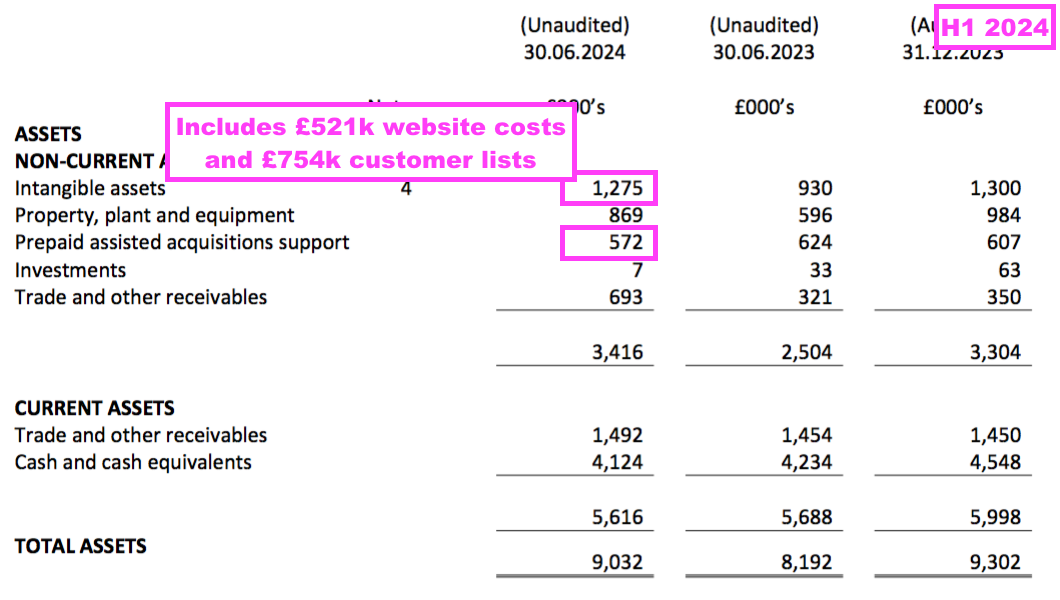
- ‘Assisted acquisitions support’ are ‘goodwill’-like sums paid by WINK to assist franchisees:
- Convert their existing agencies into WINK franchises;
- (The FY 2021 webinar talked of WINK paying four years’ worth of 8% commission to a suitable independent agent to convert into a WINK franchisee).
- Launch new WINK franchises in neighbouring locations, and/or;
- Acquire additional businesses (typically lettings portfolios).
- (The FY 2022 webinar talked of WINK paying three times 8% of the revenue from a target lettings portfolio on behalf of a franchisee).
- Convert their existing agencies into WINK franchises;
- WINK’s intangibles add up to £1.9m, and compare to the modest £211k net trade working-capital position…
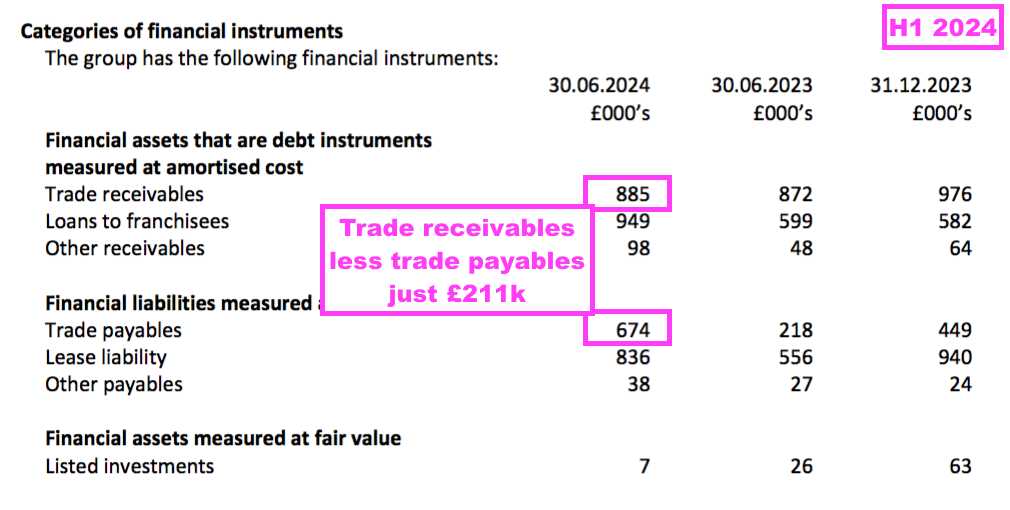
- …as well as office and computer equipment that last sported a £77k book value (point 12).
- H1 finance income of £63k implied a 2.5% annualised return from the £4.3m average H1 cash position and the £766k average H1 loans to franchisees.
- 2.5% does not seem high, especially as the H1 webinar confirmed loans to franchisees were paying interest to WINK “above base” and £1m was on “long-term deposit“:
“The franchisee loans are above base rate with a minor exception, and we have £1m on long-term deposit at the moment. It’s an area that we’re looking at to improve returns constantly.“
- The £1m was presumably placed on long-term deposit after this H1, given this H1 indicated the entire £4.1m cash could be accessed within three months:
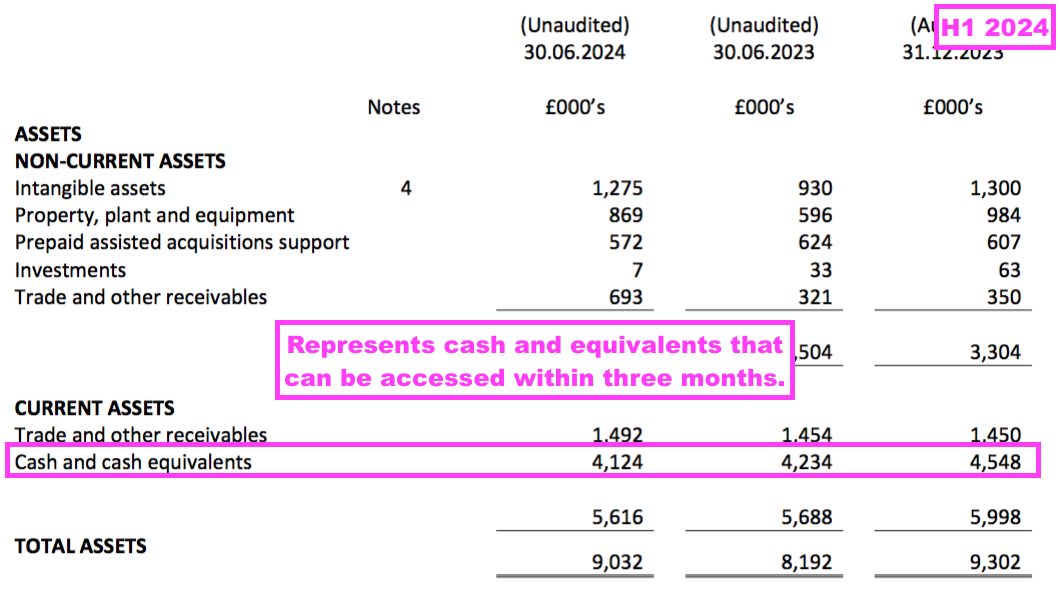
Valuation
- This H1 said H2 2024 had started well for sales but less so for lettings:
“Sales agreed have noticeably accelerated since the general election in early July 2024. This increase in activity has been fuelled by the highest number of properties on the market in the last five years and so reflects supply meeting demand rather than demand driving price increases.
…
In the lettings market, we see more uncertainty as the market awaits the implementation of new legislation.”
- January’s Q4 2024 update reiterated the positive H2 for sales while suggesting lettings had also made progress due entirely to rent increases:
[Q4 2024] “The cost of finance continued to decline over the course of FY 2024 and, as a result of this and households rebalancing their needs after a long period of uncertainty, we saw a strong upturn in sales agreed. Having risen by 19% year-on-year in H1 2024, the number of sales agreed rose by 27% in H2 2024 and by 23% for the year as a whole. Completed sales in FY 2024 rose by 19%, compared with the prior period, and the Board is pleased with the momentum going into FY 2025.
…
The renewed focus on sales was reflected in slower lettings activity. Lettings applicants in 2024 were 5% down on 2023 figures, but full year revenues are expected to have risen by 5-6% due to rental price increases.”
- January’s Q4 2024 update confirmed a £2.35m pre-tax profit and at least £3.9m net cash for FY 2024:
[Q4 2024] “Winkworth’s full year pre-tax profits, subject to audit, are expected to be in line with current market expectations of £2.35m (31 December 2023: £2.15m) with net cash at year end to be at least £3.90m (31 December 2023: £4.55m).“
- A £2.35m pre-tax profit for FY 2024 implies an H2 2024 pre-tax profit of £1.3m, which would surpass all previous H2 pre-tax profits except H2 2022 (£1.4m).
- FY 2024 net cash to be at least £3.9m indicates H2 2024 experienced an approximate £200k cash outflow.
- The H2 2024 cash outflow presumably followed further loans to franchisees to help establish some of the aforementioned five branches in the pipeline and seven re-franchises under negotiation.
- FY 2024 pre-tax profit of £2.35m compares to £2.5m for (pandemic-boosted) FY 2022, £3.2m for (pandemic-boosted) FY 2021, £1.5m for (pandemic-blighted) FY 2020 and £1.6m for (pre-pandemic) FY 2019.
- £2.35m after standard 25% UK tax gives earnings of £1.8m or 13.7p per share.
- Earnings of 13.7p per share cover the total FY 2024 payout of 12.3p per share by just 1.1x:
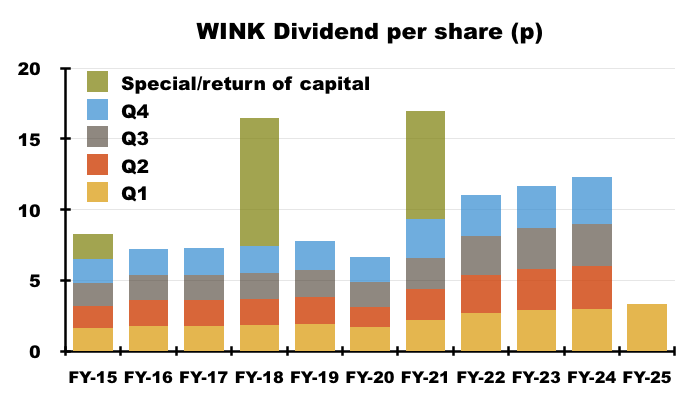
- In fact, if the Q1 2025 dividend of 3.3p per share is annualised for FY 2025 to 13.2p per share, then dividend cover will reduce to almost 1x unless profit can increase further.
- Then again, the Q1 2025 dividend was lifted a handy 10% to 3.3p per share, suggesting WINK is optimistic about FY 2025.
- Indeed, profit may very well increase during FY 2025 as WINK could have enjoyed a bumper Q1 2025. January’s Q4 update referred to stamp-duty changes encouraging transactions to complete during Q1 2025:
[Q4 2024] “With buyers having been motivated by real wage growth and the anticipation of lower interest rates, we expect activity to remain positive in FY 2025, with a particular weighting to Q1 as first-time buyers look to transact prior to the ending of the stamp duty discount in April 2025.
- Profit may also increase during FY 2025 should “good profitability” be achieved at all four company-owned offices.
- Dividing the 200p share price by my 13.7p per share earnings guess gives a P/E of 14-15x.
- A possible multiple of 14-15x is not outrageous, but is beyond WINK’s typical trailing P/E of 10x-14x:
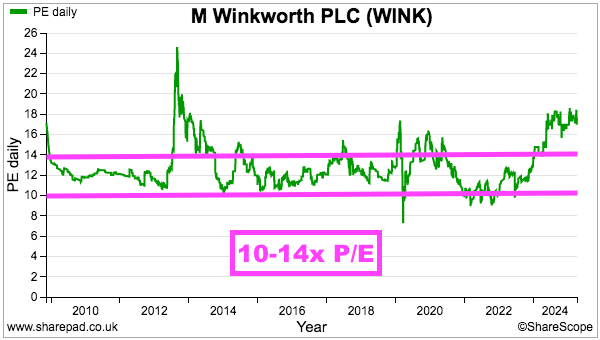
- The 12.6p per share trailing twelve-month dividend meanwhile supports a useful — but not entirely unusual — 6.3% income:
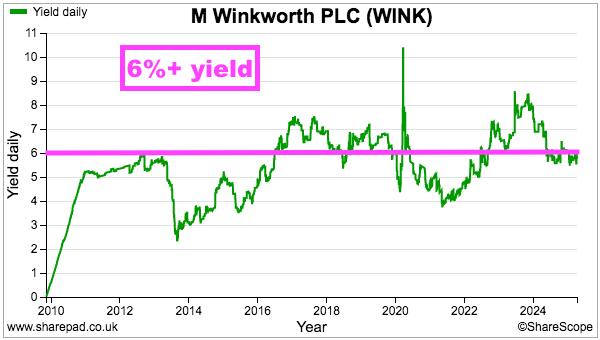
- While new openings, revitalised branches and Tooting-like investments could underpin near-term progress, longer-term earnings growth may well require a fundamental improvement to transaction activity within the wider property market.
- I first bought WINK during 2011 at 90p and the shares have since delivered a very generous income. Total dividends (ordinary and special) plus a return of capital throughout the last 14 years have totalled 126p per share to recoup my entire initial investment.
- Add on the 110p per share capital gain during the same 14 years to my income, and that initial 90p purchase has returned an approximate 9-10% CAGR:
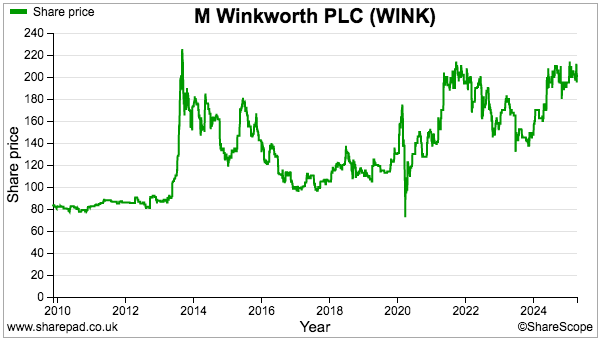
- A 9-10% CAGR is acceptable but not incredible, and the risks for long-term shareholders hoping for more include:
- Transaction volumes within London (and nationally) continuing to stagnate;
- Industry ‘growth’ faltering as an increasingly frail economy diminishes property valuations and rental affordability;
- Further branch closures and re-franchisings, as less talented franchisees fail to sustain the necessary top-three local position;
- Heightened competition forcing competent franchisees to cut their own commissions to remain competitive, which in turn reduces WINK’s 8% service-fee income, and;
- The board’s desire for dividends and notable net cash, leading to only modest investments in potentially lucrative new opportunities.
Maynard Paton
